Character Analysis - Blog Posts
i think there is something truly refreshing about even the subtle aspects of lucy's character development.
a female character who was indoctrinated to internalize reproduction as her purpose but whose curious heart longed for something else even if she never allowed herself to pay any mind to those cracks in her psyche, mustering up the courage and setting herself free by leaving vault 33 when vault 33 needed its' people to reproduce the most.
consciously, she was going into danger to save her father. but subconsciously, she was motivated by curiosity for a different life and purpose. the whole thing was like a destined excuse for a journey of self-discovery.
she went from probably not realizing herself why she struggled to force a smile when stephanie mentioned motherhood, to being horrified and enraged when she thought vault 4 was using women as the breeding machines, and then she found out that every vault was actually using every woman as just that, stripping them off of their bodily autonomy and choice.
i just think there is something liberating about this whole line of character development, even if it's presented in a very subtle way.
can't wait to see how her journey with cooper changes her. tbh, one of the reasons why i like lucy x cooper as a ship is bc lucy won't get pregnant by the ghoul, and it's another reason why their potential romantic dynamic would feel special.
i honestly think the ghoul believes lucy is just full of shit until she gives him those vials. like he does not believe she is genuinely that good of a person because no one is that good of a person anymore, and because she is the product of vault-tec middle-management. he is constantly expecting her to show her "true colors" (hence "there you are, you little killer" after she bites off his finger) until that moment when she chooses to help him despite the fact that he's done nothing to deserve her kindness. COMPELS ME!!!!
What do you think were madaras coping mechanisms if he had any
?
Thank you for this ask! Canon characters like to think of Madara as a madman who fell from grace because of his thirst for power, but based on what we know of him, that isn’t quite true.
Coping mechanisms are ways to decrease stress and deal with the uncomfortable emotions that arise from stressors. We all know how important family is to Madara. He was particularly invested in the welfare of his one remaining brother, Izuna. Madara’s coping mechanisms can be separated into those from before and after Izuna’s death.
Adaptive Coping: Before Izuna Died
Madara and Izuna led the Uchiha together and brought their family into their position of being one of the two greatest clans, not an easy feat during the Warring States Era. They seemed to have provided the clan with different aspects of leadership –Madara with godlike military strength and protection and Izuna (who was also very strong) with the political savvy and interpersonal skills to lead a group of people.
Madara was good to his family and there are no accounts of him being a poor leader at this time despite the unending stress from the conflicts they faced. Madara’s way of coping during this period was to throw himself into taking responsibility for his clan and to confide in Izuna.
Taking responsibility- Taking control of a situation is usually considered an adaptive method of coping. After the pain of his other brothers’ deaths, kid Madara believed himself responsible because he wasn’t strong enough to protect them, as seen during his childhood conversations with Hashi by the river. I think the losses of his first brothers greatly spurred him into taking on the responsibility for the wellbeing of his last brother and clan. (You can see how much sleep he lost from his eyebags haha). Madara became as strong as he was not only because he was a talented genius, but because he sincerely wanted to protect those he loves. He got much, much stronger off-screen and attained the MS alongside Izuna and they brought the Uchiha to new heights.
Confiding in Izuna- I think this one goes without saying. Izuna was Madara’s emotional rock and anchor. It was only right before Izuna was killed that Madara started his decline as a clan leader and eventually lost their support.
Maladaptive Coping: After Izuna’s Death
Madara’s fate after his beloved brother’s death was truly tragedy. His coping mechanisms could basically be summarized as bottling his grief, anger, and suffering inside until he exploded and lashed out, before isolating himself when lashing out didn’t work.
Madara didn’t go mad right after Izuna’s death. He was still doing everything he could to be the responsible leader of his clan and work with Hashirama. To be honest, he was set up for failure from the beginning due to how Konoha’s political structure was designed. That is, it was biased against allowing the Uchiha into positions of political power. He could have lowered his expectations (a coping mechanism that just doesn’t fit Mads) for Konoha, but he’d still slowly wither away inside because he would be failing to keep his promise to Izuna. There were multiple flashbacks that illustrated Madara’s resentment, such as in his facial expressions during his battles with Hashi or his interaction with Muu and kid Ohnoki. Madara was just bottling it all up.
I think Madara truly wanted the best for his clan and could clearly see the situation they were being forced to settle with wasn’t in their best interests in the long-term. But he didn’t possess the social skills that Izuna did and could not convince his clan to stand by him, and even ended up ostracized by them.
It was only from this point onwards that Madara really fell apart. He lost everything: his immediate family, his extended family, his purpose, and he helped found a village that could only be described as being uneasy about him. Madara never verbally asked for help, but he did in his own way, by lashing out with angry outbursts at Hashirama, who promised much more at the founding of Konoha, who was supposed to understand him, but actually didn’t. Hashirama never helped with the discrimination the Uchiha faced.
To cope, Madara isolated himself. Thus began the loneliest decades of his life, where he spiraled further and further down until he was the senile grandpa Obito met, who was even susceptible to a Venus fly trap’s ploys. He still believed in taking control of the situation, but in a much more twisted way than in his younger years. Whereas in his youth he wanted to protect what he cherished, in his twilight years, Madara came to the conclusion it was his responsibility to save the entire world by becoming its Messiah through the Infinite Tsukuyomi Plan. The rest is history.
Headcanons for madara with a s/o ? Like relationship headcanons ? What type of person would he be attracted to ? That kinda stuff ...
Hello there, anon, thank you for the ask! 💜
What type of person would he be attracted to?
I think I'll answer this one first, because I feel like knowing what kind of person he would find attractive is important for answering your first two questions.
I've seen several debates on what kind of person Madara would like. I've seen people who say he would have loved someone strong and imposing and I've seen people who like the idea of a submissive s/o. I both agree and disagree with both of these opinions (but please, no hate towards people who believe in either of these headcanons).
As we saw, Madara certainly values power, and therefore it's easy and quite logical to assume he would enjoy a strong and not easily scared s/o. Especially, if we look at the times he was born in, strength and power seemed like the only thing that could guarantee survival. People in Warring States Period (WSP) had to be strong to survive, and this would go for Madara's s/o as well.
So, looking at it from this point of view, I believe it's true Madara's s/o would have to be quite strong and perhaps in some ways dominant.
On the other hand, I believe Madara might have found liking even in someone quiet, someone who looks very kind and gentle from the very first glance. There is strength in silence, kindness, and gentleness too.
Overall, I would say Madara would be attracted to someone who supplements him, who inspires him, someone who challenges him to become better. Someone with whom he can move forward, someone who will support him, believe in him, believe in his plans, someone who will be the heart of his goals. His s/o would also have to be at least a little persistent, I think, because I headcanon that Madara is very private individual who doesn't let people close easily.
Appearance-wise, I don't think Madara would have special demands or expectations for his s/o, I feel like to him appearance doesn't matter as much as personality does. If, however, we're taking the time he lived in into consideration, I would say he would prefer someone with a slim figure, not someone corpulent – as again, that lowers chances of survival for both for him and his s/o. (Please, I don't have anything against people with corpulent body type, I'm simply theorizing based on what we know about WSP.)
Headcanons for madara with a s/o ? Like relationship headcanons ?
Madara would be devoted to his s/o, he would love them through good and bad. I imagine that for Madara it would be important that both he and his s/o would equally be working on making their relationship successful and long-lasting.
He would show his love for his s/o not through words, but actions; by protecting them, being there for them, allowing them to see his "weaknesses", to see deep down into his "gut". And he would expect the same level of honesty and trust from them.
If his s/o would be a shinobi, he would enjoy sparring and training with them, if they wouldn't be shinobi, he might still train them at least basic ways of protecting themselves.
I would also imagine, Madara would love to share his hobbies with his s/o, so perhaps he would teach them falconry.
I also think that with his s/o, Madara would be able to show his softer side, he would show his kindness, understanding, and undying love.
From the fanfictions I found of his character, he seems to be described as a very possessive person. In a way, he might be "possessive" of his s/o – many people feel jealousy because of their lovers for example, so why wouldn't Madara, but I firmly believe he would never force his s/o into anything and would always prioritize their well-being above his own and would have respected their choices. If Madara settles down with someone, it's because he trusts them, and therefore I think he wouldn't be going around beating up other people just because they dared to glance at his s/o. Like I said above, I think he would truly, genuinely love his s/o
Lastly, to me, Madara seems like a character who hates being stagnant and who wants to grow as a person (at least before he lost Izuna), so I imagine he would share his dreams and his goals with his s/o. He would plan for a future and he would want to work together with his s/o to achieve the future they envisioned.
So...these are my headcanons, anon! I hope my answer satisfied you because I certainly enjoyed writing this! Thank you again for your ask!

Madara Uchiha is a complex character. Like his character is portrayed differently by different individuals. But all the stories about him are for the most part one off encounters or farfetched stories(expect the hashirama flashback). But the generalised version of him is this fiendish crazy person who only craves power and war and is batshit insane.
Now I don't know where Itachi got this information but he told Sasuke that Madara stole his brother's eyes to attain his visual prowess back as he was going blind due to overusing his visual powers which made Madara look like a power hungry person. In any case this was misinformation that painted Madara's character as somebody evil. Afterward it turned out it was a rumor that Madara stole his brother's eyes. Whereas in reality, he loved his precious little brother more than anything. Those eyes were given to him by Izuna in his dying bed to protect the clan.
Though Obito had met Madara before, he tells Sasuke in Madara's disguise that he loved to battle and did not want to end clashes, and was willing to take Izuna's eye to attain prevalent strength and make the clan stronger. In reality Madara only ever wanted peace. He even made peace with the Senjus in spite of Izuna's wishes to protect the clan just to end conflicts and obtain peace.
Then, in Onoki's flashback, we see that Madara demands that the hidden stone village should bow down to the might of Konoha. Onoki depicts Madara as somebody who is power-hungry and a militarist.
I figure this is often how most individuals see Madara by and large. They think he is an aggressor who is just so arrogant and powerful.
Tobirama described Madara as somebody evil and is a victim of the so-called curse of hatred. Whereas in reality after the treaty, while Madara was in the village, he never tossed tricky comments at Tobirama, didn't assault him for once, and acted civilly towards Tobirama even though his small brother died at the hands of Tobirama.
So up until now, all the things that are said about Madara come from individuals who barely knew him at all actually. This is just how they perceive Madara. A few of them believe in made up false rumors about him, whereas others judge the things he does without putting themselves in his position. This is how they made up an image of Madara based on insignificant judgment. Just the narrators painting Madara's character up with their made-up suppositions about him.
Now coming to hashirama, though, he tells his version of Madara, this can be to some degree solid, as he was Madara's close friend and knew Madara personally. He depicts Madara as somebody kind. He indeed expressed that Madara loved his younger brother exceptionally much. Now, through hashirama's flashback, we get a glimpse of Madara's gentler side underneath that hard exterior. How he let himself free a bit around hashirama. But still i feel like Madara did not open himself up completely to hashirama.
Now, this is where I think we ought to have gotten Madara's pov or Izuna's pov. A pov was much required from Madara's side to see how he thinks about things , what goes on within the mind of this complex character. Through and through, we could've gotten a far better and clearer picture of "Who Is Madara Uchiha?" And why is he the way he is?"Moreover, even if we had been given Izuna's pov, it would have been great. Protecting Izuna was the driving force behind everything Madara did and attempted to do until Izuna's tragic demise. And I think Madara would readily open himself up to his small brother completely. In case we could've gotten Izuna's pov about their interactions, how together they led their clan, and a much tender side of madara. I imagine while leading his clan if Madara wasn't able to make the right decision Izuna would have been able to see them and correct Madara if he was to take a terrible choice. I think Madara, through Izuna's eyes, would have been the foremost true representation of Madara. Also he would understand him. We could have been able to see Madara through someone's eyes who had known him all his life and adored him dearly and knew about all of Madara's vulnerabilities.
Now I'm not saying that Madara's a saint; he did nothing off-base(He had his flaws about how he tried to obtain peace through the Mugen Tsukuyomi project) . But I despise how most individuals depict him as this fiendish insane person who only wants to battle and is power-hungry. yes, he cherishes battle, after all, his favourite phrase is "armour-sleeved single hit" (databook) but that's not all that's to his character. He has numerous more layers to his identity. Deep beneath it all, he cares, He really does and he did all he did due to the circumstances he was in(I'm talking about the mugen tsukuyomi project).Let's be genuine, if Izuna was still alive then it would have been troublesome for black Zetsu to brainwash Madara and the Mugen Tsukuyomi project might have never happened. But truth is that after Izuna's death & disagreement with Hashirama, Zetsu took advantage of his depression and modified the Uchiha stone tablet to trap him in the Mugen Tsukuyomi project. Even though his path was not the correct way, but still, he attempted to end all struggles and make a world of peace for all the individuals, even the ones who loathed him.
What was Izuna's character?
Izuna is most likely one of the most mysterious character in the Narutoverse. He's truly a ghost. Barely seen but so important to Madara's storyline and his eyes the most powerful sight of the entire series. Regardless, all we know about his personality in the canon can be resumed in few sentences : He admired his brother as a child, he was also a fierce warrior from early age, he warned his brother against the Senju, and before his death willingly offered his eyes to Madara in order to protect the Uchihas. It's quite thin for a character development...
In the fandom, fanart, and the many fanfictions included, the general consensus is to represent Izuna as a soft and gentle character always devoted to his brother. Sometimes he's the victim of a hungry-power Madara (but that's really old stories back when no one knew that Obito was cosplaying Madara), often sassy and effeminate. A bit like Haku who was entirely in service of Zabuza. I suppose this idea comes from the adjectives that describes Izuna in the databook :
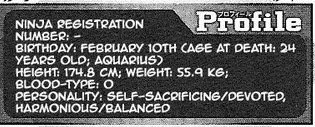
Considering the lack of information in canon, that headcanon starts to become the more popular. My ambitious is to try to discover what was Kishimoto's intentions for Izuna if he had more time to articulate that character. It's just an hypothesis that I present you, it's in no way a definite answer.
I) Intuition
That's nothing I can prove but it always seems to me strange that Izuna was the quiet one in this sibling's dynamic. If you put yourself in his shoes opened-toes sandals, he is Madara Uchiha's little brother. From birth, his brother was seen with special attention. Madara was the oldest, the heir and on top of that the genius one. Butsuma said that as a child he was able to kill adults. Being the second is virtually being invisible in front of other adults, it would have naturally created jealousy and a need to exist outside of the big brother's shadow. We've seen this same dynamic before between Sasuke and Itachi. The little one feels always left out. The difference there, is that Itachi was mostly absent in Sasuke's life, he was always busy with school and missions. And after the Uchiha's downfall, when Sasuke was just 7 years old, the distance between them wider dreadfully. For the majority of Sasuke's life, Itachi was a distant childhood memory. In contrary, Izuna seems to have stayed close to his brother until his death at 24 years old. They enjoy a childhood together and were so close than even adults they were able to take over the Uchiha clan. Because they spend more than 20 years together, sharing happiness and losses, there is for me an implicit idea that Izuna was balancing Madara and vice versa. In the same way, Hashirama's visionnary ideas are counter-balanced by a down-to-earth Tobirama. The Senju carves his unique personality by constantly creating new jutsus that surprised his opponents while Hashirama was known for being that rare and powerful Mokuton user. Madara being this taciturn person in public, Izuna must have been a bit more outgoing. So if Madara was in private described as kind by Hashirama, maybe Izuna was more rational when dealing with people.
II) Canon + extra materials




in extra materials I mean : databook, official card, official illustrations, video games ect...
Even if I'm team canon-only, sometimes other fillers or goodies can give us a hint of what would have been Izuna. And two things catch my attention :
first, he's always represented as someone very confident, holding a sword ready to slay someone, focused. Actually...he NEVER SMILES. He smirks once in a filler when he thought he was about to overpower Tobirama. It shows more his merciless attitude towards his enemy than any trace of softness. We are very far from the flower boy from fanarts.
secondly his voice...Have you heard his adult voice? It's surprisingly deep comparing to his slender appearance. Again it doesn't sound like a fragile baby doll but more like a commander in chief.
III) Izuna vs Obito
It took me a long time to realise how much Izuna is in the canon constantly in parallel with Obito. It goes back to my old post on "why Madara chose Obito". Months later, I think the answer is more obvious that what I thought back then.
Izuna simply might have had a very similar personality than Obito. Or should I say, Madara saw in Obito, not only his potential strength but also a clear resemblance in character to his dear brother. At the Kannabi's bridge, He observed and found Obito dying after he saved Kakashi, Rin and gave his right eye to Kakashi. There is a strong parallel to Izuna's life who also gave his eyes willingly to Madara when he was dying. In both case, there is a deep devotion for the well being of their friends/clansmen.

Even if Madara consciously chose to cut bonds with the world, unconsciously he still yearned for companionship. It's obvious by the fact he couldn't stop talking about his friend Hashirama, and in the similar way he looked for his "right hand" in Obito. Yes, in a deranged and manipulative way but even during the war, he never doubted Obito's intentions until it was obvious that he betrayed him.
So not only Obito was a replacement for Izuna as a brother in arm, but the databook gives them the same birthday the 10th of february, obviously the same zodiac sign Aquarius and most importantly the same blood type.
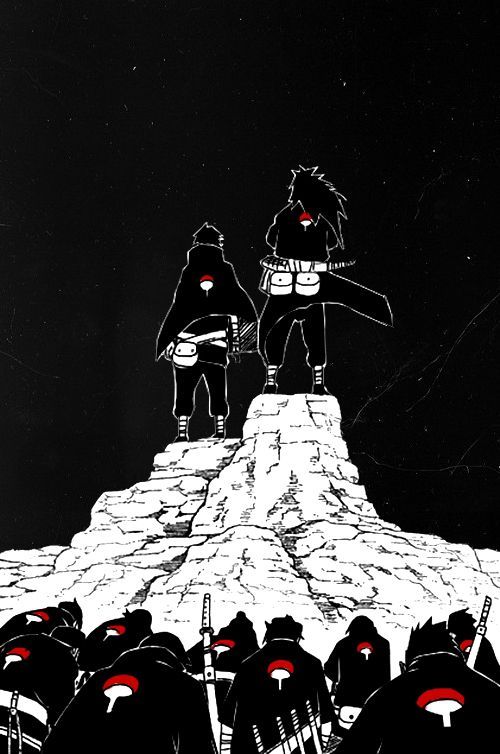
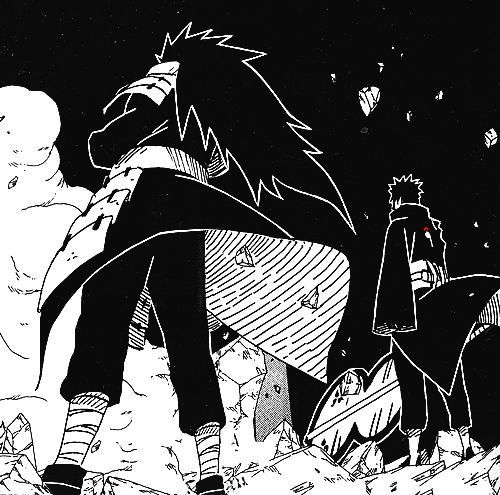
IV) Blood type

Izuna and Obito are said to be the same blood type O. Madara also is type O. As a westerner I've never paid attention to this information (I don't even know my own blood type to be honest!😅) until I've learned recently that Japaneses have got a whole culture associating blood type with certain personality traits. They take this more seriously that astrology to the point there is even campaigns to prevent discrimination towards rare types. Since I don't know much about this theory, let me quote some other sources.
So what is type O?

source : https://www.tofugu.com/japan/japanese-blood-type/
This source goes deeper into type O in Naruto.

source : https://aminoapps.com/c/naruto/page/blog/blood-types-personality-theory-in-naruto/lrqm_VpiQuDpPEDjoMXgoMVnn0E3eeXmpw
I don't really know how to interpret the type O because the adjectives seems very larges and vagues to me. but it seems that leadership trait, hard working, outgoing, protective, direct, confident are the trait that comes the most from the various sources I've read. In Naruto, the others type O are : Kakashi, Asuma, Sakura, Temari, Raikage, Neji.
An other interesting aspect, is relationship between each types. Look closely at OxO relationship.

Let's go back now to compare now Izuna and Obito's databook pages with this new information in mind.


Notice again how Izuna is systematically showed in action, fighting someone or ready to attack. That's not really a moment where he looks relaxed with an easy-going attitude.
Izuna's favourite hobby was training with his brother Madara. Because of their closeness as brothers they developed an healthy competition. A good OxO relationship.
In the opposite, considering the circumstance of their meeting, Obito never truly trusted Madara and even when he agreed on the Tsukuyomi plan, he decided early on that he'll do it his own way and almost overtook Madara's role as the "saviour". It shows a negative OxO relationship.
In this perceptive, it seems to me that Izuna and Obito share in common of being extremely strong-willed and competitive. They have an inflexible determination that never sways. After being deadly wounded, Izuna still found the strength to warn Madara about the Senjus and again in his deadbed he made Madara promise to watch over the Uchiha clan. His vision (even in the literal way) was strong enough to motivate Madara long after his death. This devoted, balanced personality must be read as a confident desire to protect his people, the Uchiha clan, to the point of self-sacrifice.

Obito demonstrated two times an incredible will. Once as a child when he defended Kakashi's father and swore to destroy an unfair shinobi system, and a second time when he battled against the juubi. He knew he wasn't physically strong enough neither to hold the rinnegan nor contain juubi inside him but by cheer willpower he forced his destiny.

To conclude my guess is that Kishimoto intended Izuna as a warlord, a man of action, just like Madara, with a strong sense of duty and sacrifice for his clan. And the Senju represented to him the epitome of threat for the Uchiha's peace. Izuna pictured peace and harmony related to his clan not the whole world like his brother did (and maybe that's why he had to make him promise to protect the Uchihas first!?). He was probably more extravert, agreeable and also more distant emotionally than Madara. His interaction with his big brother must have been a funniest version to what we've seen with Obito. Just imagining those two uchiha big egos together, they were probably insufferable for their opponents 😂. If you read the manga again it's as if Madara is expecting a back-and-forth banter with Obito...just like Izuna would have done with him in the middle of a battles.😢

That's all I wanted to share on my hypothesis, maybe in future Kishimoto will give us something about Izuna's past and this post will age badly but let me know what you think of this theory?
100%. This scene only seems funny, but it's actually heart-wrenching. Madara did his best
thinking about this anime-only scene and how despite its silliness, it perfectly illustrates the dynamic between madara, hashirama and the village.
when the both of them see the child fall, madara is the one to rush over. not that hashirama doesn’t care, but he simply isn’t immediately spurred into action to help like madara is. it’s a reminder that madara is fundamentally kind and caring, he has good intentions! yet the girl in question isn’t put at ease by him at all. taking into account how she seems too young to have encountered madara in the warring states era, her reasons to distrust him aren’t tied to any personal hurt; she judges based on appearances, and madara’s doesn’t seem to evoke anything good. the situation has only escalated, the girl now scared and crying, until hashirama appears and immediately calms the girl down, due to his natural charisma (in the scene before this one, we see how the entire village happily and respectfully greets hashirama as he passes by, with someone even handing him that flower as a gift). it’s only after hashirama has shown up that the girl thanks madara too, and the issue finally resolves itself.
this pretty much represents the whole of the village. madara isn’t really trusted by anyone there, and mostly seems to be given a pass only because hashirama covers for him. despite madara’s own efforts to grow and become a kind and worthy leader to the village, he remains very dependent on hashirama’s charisma and reputation to even be given the time of day. so then of course, once hashirama’s efforts to defend madara begin to wane as he starts to side with the village too, it’s only natural that everything comes crashing down.
Madara's Best Friend

If Madara and the others in this post lived under different circumstances, I think it makes more sense for Madara to be ‘best friends’ with either Tobirama or Gai. They are more compatible with Madara than Hashirama. Not considering Izuna as Madara’s best friend since that wouldn’t be fair. Izuna probably knew Madara better than Madara knew his own hand. No I don’t ship Mads with Hashirama, Tobirama, Izuna, or Gai, but seeing wholesome MadaGai comics made me think how this entire time, those artists had a point.
Hashirama
Others have discussed this extensively, but while Hashirama is the only one who can fight Madara as an equal, he wasn’t a good friend to Madara. Beyond the initial founding of Konoha, which stemmed from a genuine desire for peace and wanting a better future for young ones, Hashirama was selfish in his motivations for why he wanted Madara to stay in Konoha. It was always about the village for Hashi. There was never genuine reflection about Madara’s concerns or consideration for his well-being, even when Madara was basically screaming for help in his own way. Hashirama was also not even close to Madara on an intellectual level. Not that I think Hashirama was the total airhead he liked to present himself as. On the contrary, I think he was often quite manipulative when he pretended to be dumber than he is. But whereas Madara had the capacity to foresee far into the future the issues about shinobi villages due to their social structures, Hashirama was set on his ideals of what the village must be like and unwilling to stand up to defend his ‘friend’ Madara. And then he killed his best friend over his flawed beliefs once Madara no longer played by his rules.
I think Hashirama would only be suitable for being Madara’s true sparring partner/rival, even if Gai would exuberantly declare himself ‘rival’ anyways.
Tobirama
This only applies if Tobirama left Izuna alone.
Tobirama tried to make the village work. And to his credit, the village worked. It survived well into the future thanks to social structures and policies enacted by Tobirama. Tobirama was the one who propped up the village and ensured it ran smoothly after its founding, not so much Hashirama, even if Tobi’s ways eventually lent themselves to the dark underbelly of Konoha that Madara foresaw. The intentions were noble, even if his methods flawed.
If neither Tobi nor Hashi killed Izuna, Izuna would likely have survived until much later. If Madara was somehow convinced for a truce and to build a village anyways, Izuna at his side would be a much more level-headed negotiator than Madara and would ensure the treaty was fair to the other founding clan, the Uchiha, too. If the canon events had been even slightly different, I believe there was ample opportunity for the Uchiha to thrive as well. The entire story could have been so different.
Despite the abundant past misgivings between the Uchiha and Senju, I believe Madara and Tobirama could be friends who respect each other if Izuna lived and they were all working on Konoha together. They are much closer intellectually, quieter and more introspective, would be able to bounce more realistic ideas off each other, maybe invent new jutsu together. Tobirama was pragmatic and logical, which could be a better foil to Madara than Hashirama, who seemed to often drive Madara to extreme emotion.
Gai
This lovely cinnamon bun is among the purest characters in Naruto. There isn’t a single vile or dark thing about him. Even his teeth are shiny. He would be so good for Madara and his mental wellbeing, like he was for Kakashi. Gai tried to hang out with Kakashi when the Copy Cat was traumatized by multiple deaths so he wouldn’t be alone, protected Kakashi when he was distracted on a mission and almost got killed, and was just there when needed. Even when he was pushed away repeatedly, Gai never gave up on his friend.
If Madara had a real friend in Gai like Kakashi did, one who will be present and support his buddies through anything, who knows? I’m sure the grouchy hermit Madara would resist and try to push this overbearing green beast away too, but that wouldn’t stop Gai’s insistence. The ridiculousness to ensue would have been a balm for Madara’s tortured soul. Both men’s dedication to the future generations and physical training are also bonding points. With someone who still cared for him, maybe Madara wouldn’t have gone down the path he did so readily? Madara was at a point of total isolation without Izuna and the support of his clan, an untrusted outcast left with no one who still wanted his protection when he abandoned Konoha. At that point, he didn’t have anyone to look out for his back. He was also abandoned. It’s really tragic.
Have a picture of happy Madara. It’s uncommon.

Madara vs Kunoichi/Medics

Did Alive!Madara take it easy when fighting kunoichi and medics back in the day?
I think he would have, even if I'm sure it can be assumed he has killed some of both groups before, when all everyone did during the Warring States Era was fight day in and day out. It was a much more cut throat period and surely more underhanded (strategic) tactics such as going after medics would have been employed.
Edo Madara derisively asked Ohnoki what adult would "go all out against mere children." Granted the Kage group he fought included 2 female "children" who he also beat the crap out of, but those two were different from the average kunoichi. One was Senju Tsunade, who was a Senju and a medic AND a Kage. But it was for her offense of being a Senju directly related to Hashirama that made Madara specifically say he'd kill her first. It had nothing to do with her status as a medic or a woman. In fact, Madara went so far as to say her healing capabilities were negligible against him.
That went for all other medics in the Shinobi Alliance too. They were so insignificant they were not even worth going after, at least until he decided to perform large AOE jutsus and squash everyone. But at that point, it wasn't like he was going after medics OR women in particular. Madara tended to just deal with whoever showed up against him. So if a kunoichi or medic attacked him, then he'd fight back.
The other notable kunoichi we saw him fighting in that battle was Mei, who was of course still a Kage. Besides Tsunade, I don't think he specifically had it out for any of them, even Ohnoki. Edo Madara had a point to make while he was spanking the Kage, to test the abilities of the current generation of Kage, then to show them know how far they were beneath him when he had seen enough. He didn't even bother killing them off definitively.
Madara doesn't enjoy beating up those weaker than him. During the 4th Ninja War, from his introduction fighting the Shinobi Alliance to his fight against the 5 Kage, even when he was going against the world with Obito and the Juubi...he just looked bored and/or disdainful. It wasn't until Hashirama's appearance that he showed true excitement. He never targeted any women (except Tsunade and Mei, for reasons as discussed) in his fights unless it was a large area attack meant to end everyone. He didn't target any nameless medics either despite acknowledging medics normally get taken out first. I vaguely recall him not even bothering with Sakura as well until he needed his Rinnegan back and she attacked him while being a 'diversion.'
As we see from the dynamics between 3-person squads in Konoha, women are often heavily protected in Naruto. Uchiha women were definitely also protected since they married within their clan and there were only so many Uchiha women to ensure the continuity of the bloodline. I like to believe the kinder part of Alive!Madara (which we know exists) extended this sentiment of cherishing women to those outside of his clan as well, which might have included mercy in battle.
What do you think?
Do you know why Spider-Verse Miles is my favorite Spider-Man?

He, without having a choice, had to do in two days, what took all the other Spider-Sonas in the multiverse weeks, become Spider-Man, all under the unimaginable pressure of being the successor to the previous Spider-Man of his universe, which left the bar too high, having to meet everyone else's expectations, and having to go through a tortuous journey while learning from his mentor.

Even when the spider-gang not only didn't trust him but even seemed to dislike Miles at first (Except, of course, Gwen and Peter B, who are very special cases)

And pressing him to see if he was ready and treating him like just a kid (Even Peni).
All so that he then went to his uncle, who was like a second father to him and someone who truly understood Miles, only to find out that he had always been a hitman, going so far as to almost end with the life of his nephew, until he realizes what he was about to do and... well, tragedy happens.

The death of Uncle Aaron, due to the depth and history behind it, remains the most tragic "death of Uncle Ben" in all of cinema... ever.

Miles stopped being the same since then, and even when a hurricane of emotions possessed him, he learned that no matter what, Spider-Man always gets up and keeps going, at the same time he learned to take his leap of faith. Before becoming Spider-Man he had a normal and happy life, but after being bitten by that spider his whole life fell apart, but of course, Miles is someone truly strong and full of determination thanks to the people close to him.
In two days, he surpassed almost the entire Spider-gang, and in a year and a half he become almost a professional as Spider-Man, even giving lessons to everyone else, and making it clear to Gwen and the others what truly means being Spider-Man, not standing by crossed arms while someone is in danger, but trying to do everything you can to save everyone, doing both things, even when it seems impossible, Spider-Man should always try, because everything it's possible.

At the same time that Miles felt stabbed in the back by the same people to whom he wanted to dedicate his entire future just to see them again since he felt alone and sad inside in the world without them, and, specially, without Gwen.
And let me remind something, Miles actually thinks she doesn't even love him and only sees him as a friend, but he still wants to see her
On the ATSV betrayal, he release all that hurricane of emotions that he had to swallow and accumulate inside during ITSV and during that entire year and a half for not having time for ALL those things said before, leading him to have anxiety and panic attacks (Something confirmed in the synopsis of the short "The Spider Within")

All so that they later reveal to him that he was a mistake, an anomaly, that he should never have been Spider-Man, that he killed the Peter of his universe, causing everything that gave MEANING to his life fell down in just a few minutes, leaving Miles more traumatized, mortified and with more trust issues than he already had before.
He really became one of the most tragic character of all the saga (Along with Peter B and, put it in some way, Miguel O' Hara)

And just because Miles looks with a cool and chill personality doesn't mean he's any less traumatized and mortified on the inside (An example is Andrew Garfield's Spider-Man).

Even though in the comics that nickname is only used because that is what his universe is called, in the movies, on the other hand, even though there are people on the internet who deny the fact that he is currently becoming an unstoppable phenomenon that is marking an entire generation and will mark future generations, Miles Morales proved to be, without a doubt, the Ultimate Spider-Man.
As a bonus, even though she always screwed up with everyone around her, both the living and the dead, Gwen showed that she really loves Miles and that he truly is the love of her life, however, needless to say, she has a lot of work to do in her redemption arc to be able to fix things with Miles, which will be very difficult but not impossible, even more so taking into account all the hate she received for everything that happened in ATSV.

Now she has to PROVE not only to him, but to all of us viewers, that she truly deserves to be with Miles, that they can have a life together by her own merit, and that all the hate towards her after the ATSV release it's truly unfair.
However, I have to be realistic, there are characters like Peni or even Peter B who should not be anything more than simple 'acquaintances' or 'partners' for Miles, since, with what they did, the term "Friend" It's too big for them.
In any case, Miles has the last word.


Seeing these two convey emotion outside of their normal Apathy/Bloodlust(respectfully) is honestly jarring and adds another element to their already established characters and I love it.
Calling all Alex Law Fans!

If you're a fan of Alex Law from Shallow Grave, I need your insight!
I had a riveting conversation with a moot last night about Alex. We discussed this snippet of Danny Boyle's interview about the movie:

So, I've always seen people talk about Alex being bisexual and I never knew why. Fun fact about me: I'm not good at recognizing sexuality 😅. Now, I'm curious! If you're in the "Alex is bisexual" camp and willing to talk my ear off about how you picked up on the signs, then consider this your invitation to jabber with me! 😁
P.S. I got the snippet from BOMB Magazine on Pinterest. Here's a link to the full interview: https://bombmagazine.org/articles/1995/04/01/sundance-danny-boyle/
Every time I get told I’m under-qualified for something and respond with the reasons I am in fact qualified, I feel like this

A Rant About Wander
We all know how obsessed/crazy Wander can get if he's not able to help people. It's how he acts in "The Sick Day," but also "The Helper," where we see a glimpse of Wander's heroic, black-and-white personality; the person he is without his core self:


For the first time, we see Wander look at Hater as a bad guy he has to "stop" and he can't believe that, behind all his evil deeds, he's a normal guy just trying to pick up his lunch. A similiar moment happens in "The Wanders," where Wander sees Hater as a heartless evil-doer and says: "I am a good guy, and he is a bad guy, and I stop him!" he's like Brad Starlight It's clear tunnel vision


When Sylvia tells Wander how it's good that people don't need his help all the time, he's curious as to why. Wander's so used to being the nice guy that he wonders why it's a bad thing that he's one to such an obsessive degree.


It's not just that he enjoys helping others or that he empathizes deeply with everyone due to his (unexplored) past; Wander also wants to feel worthy/good about himself. Look at this line from "The Big Job":

Wander feels WORTHLESS when he messes up, he feels worthless when he's not doing anything for other people. His desire to help stems not only from past pain but also feelings of not being good enough and he buries them deep deep DEEP down
As humble as Wander is, he enjoys being seen as a legendary hero because it makes him feel important. See how excited he gets here?

Hero Wander is even a part of him, as we see in "The Wanders"; there's no way he doesn't have savior complex/hero syndrome:


Wander never denies being 'the legend.' On the contrary, as soon as Hank starts describing "The Hero," he figures out he's talking about him and says "Oh, really?" like he's reveling in that fact:

He just goes with the kids' portrayals of him even though they aren't accurate. And he knows. He KNOWS that the Yonder galaxy thinks of both himself and Sylvia as heroes:

"The Family Reunion" shows exactly how well-known Syl and Wan are:

There's also this deleted scene from "The Hole... Lotta Nuthin'" where Wander pretty much reveals that he KNOWS he's very well-known and is being just a tiiiiiiny bit arrogant about it:

When Wander doesn't feel worthless, he acknowledges/ doesn't deny/enjoys being seen as a hero, but when he's down in the dumps, he'll straight up say he's not one, which is what he said in "The Big Job"
Then there's this moment in "The Good Deed" where he's being a show-off:

Wander not only has flaws, but he's actually no stranger to negative emotions either.
In "The Good Deed," he gives in to nihilism:


Wander was ready to drown himself in mud because he thought doing good was pointless in the end, that things will turn bad anyway no matter what he does. I never saw anyone talk about what this scene implies, but it's both really dark and really heartbreaking. WoY actually tackled it with care and a good moral about life, though
He's heartbroken when he thinks his good intentions didn't amount to anything ("The Gift 2: The Giftening"):

He feels hopeless after repeated failure and needs Sylvia to lift his spirits ("The Liar"):


In "The Show Stopper," he's so focused on getting Dominator to notice Hater's concert that he completely forgets to rescue the bunny folk (he probably came back for them later, but the thing about Wander is that when he's hyperfocused on a specific thing or goal, he's HYPERFOCUSED).
In "The Battle Royale," he gets so caught up in getting Hater and Dominator together that he accidentally creates an entire warzone, gets McGuffin fried, and becomes (temporarily) discouraged after he thinks he failed to set the two up (and soften Hater's heart):


And yet, no matter what happens, he always bounces back ("The Flower" shows this best), either with Sylvia's help, or on his own. Season three would have challenged him, though:

In "The Void," Wander is selfish and controlling and only thinks about what he wants to do, and what's interesting is how that was metaphorically shown by having him control Sylvia like she's a puppet:

This episode suggests that a part of Wander, at least subconsciously, sometimes wants control over Sylvia (best seen in "The Tourist," where he constantly neglects her need for rest so he could compete with Trudi). This ties in with another thing I want to talk about, and that's how there's a clue in "The Rider" that Wander didn't have a deep one-on-one friendship with anyone before he befriended Sylvia (even if he had other travel partners). He literally had to consult Frederick about how to handle the falling out between them:

Wander always had acquaintances, strangers he helped, and villains he reformed around him; he probably dated many people, too. But he never bonded with someone who genuinely liked being around him, who cared about his safety and well-being and who'd always have his back. He and Syl are found family siblings to me He's so used to either being by himself and doing whatever he wants or only making casual connections; it's understandable why he'd struggle with thinking about others' feelings at times. Yeah, Wander takes care of people in a practical sense, but intimate relationships where he sometimes has to sacrifice his autonomy are still new to him.
Tl;dr Wander looks silly and shallow but he's such a flawed, deep character when you peel back the layers.
Ford’s love for & view of Stan pre-memory erasing: a lengthy analysis

A big misunderstanding going on in this fandom is the idea that Stan was the one yearning for Ford while Ford was too busy hating Stan (at worst) or at least thinking he hated Stan (at best), too focused on his research and academic accomplishments to pay his repressed/heavily denied love for Stan any mind, up until Stan’s sacrifice in Weirdmaggedon. Ambitious, self-centered Ford, who would be shocked at the preposterous idea that he still loved Stan deep down if, say, his post-Weirdmaggedon future self revealed it to him. “I thought I hated you, but I was wrong,” old Ford says to Stan, remorseful... and painfully out-of-character!
Another very popular idea is that Ford genuinely values the greater good over Stan, to the point he wouldn’t have rescued Stan if their positions were reversed. This idea is so rooted in people’s minds that when Ford’s most dedicated fans attempt to defend him, they argue that he was right to be angry about being rescued from the portal because Stan was acting irresponsibly (as if Ford wouldn’t have done the same thing). This is not about anyone in particular—it’s a tendency I’ve seen repeated again and again and again, in different ages of this fandom.
The gap between Stan needing Ford vs Ford needing Stan is so big in some people’s minds that they seem to think that poor, guilty Ford ending up with Stan all alone on a boat wasn’t the best ending for him. That was just Alex trying to make a point about “family above all” in a show about family, teaching Ford a lesson, and rewarding Stan’s unhealthy codependency...
It’s just incredible how Ford’s own love and yearning towards Stan is shoved under the rug by the fans!
I understand why, of course. Ford is arguably the most complex character in Gravity Falls. His love for Stan is shown more subtly than Stan’s love for him. You have to actually pay close attention, and often enough people aren’t invested enough in the Stan twins’ relationship to do so. Sometimes because they’re more invested in the relationship of Stan and/or Ford with other characters, and this is not throwing shade, either—on my part, I can admit I am so invested in them that I don’t care as much for other characters, and that’s natural.
My most controversial takes here are: 1) Ford has always known he loved Stan. Yes, even at his most bitter. He just didn’t think Stan was worthy of that love. 2) Ford valued his family, including Stan, over any noble ideal of greater good. 3) Ford missed Stan and yearned for his company just as much as Stan missed Ford and yearned for his company. I have dedicated this particular meta to pointing out not all moments (that would make it longer than Tolstoy’s War and Peace, just by the amount of times Ford mentions Stan in his journal) but the most telling ones re: Ford’s repressed but obvious love for Stan and their implications. I’ll break it into a few different subjects that I believe drive my point across.
Ford’s sentimentality over Stan:
A good place to start as any. Stan is in literally everything Ford does, sometimes in ways so subtle that people miss it, and in ways that Ford himself would love to deny, even if it meant lying to himself. Ford is very, very sentimental, and that is reflected in his relationship with Stan through the decades, with all the different paths he takes to cling to his past and the idea of his brother.
Let’s explore some examples, shall we? We don’t need to go far.
First of all, the Mystery Shack cottage, commissioned by Ford and built by Dan Corduroy according to Journal 3, is clearly based off a childhood toy he shared with Stan.

It doesn’t stop there, of course. Ford loves his boat motif decorations. (At least the boat on top of the shelf is very likely Ford’s choice of décor, and not Stan’s, given that it’s placed beside Ford’s shrunken heads referenced in Journal 3; we know that the boat painting belongs to one of the Stan twins and not Dipper, since it was already there in Tourist Trapped as Dipper arrives. I think it’s fair to assume, given the boat on top of the shelf, that it was also Ford’s.)


And would you look at that, his favorite place in his beloved Gravity Falls, a town full of wondrous places full of fantastical anomalies and literally a weirdness magnet, is, for some reason, a lake. A very weird lake? A very cool lake? No, a lake that reminded him of his childhood, aka Stan (as seen by the drawing of a boat and the codified message). “There is no other place in Gravity Falls I would rather be than the lake.”

But that isn’t enough for Ford. He must keep, still, pictures and videos of Stan. I won’t even focus, here, on the picture of the Pines family that Ford stares at in the beginning of his college days, despite Stan and Ford being at the very center of it and it being a visual parallel to Stan’s own picture of him and his brother. That one included Filbrick and Caryn, and the speaker had just mentioned making one’s family proud. But what about the rest?
People usually focus on the overall adorableness of, say, Ford leaning his head on Stan’s shoulders or Ford’s apologies (again, in Journal 3) to notice the implications of what Dipper says: “Ford even found an old film reel of them as kids, which he amazingly saved all these years.” Even Dipper himself is amazed. I’ve seen people assuming that Ford had these and forgot about them, or that Caryn was the one to send him these and he simply agreed to avoid a fight (there is a tendency in this fandom to think of her as a very doting and/or caring mother, but we have no evidence to think so, as explained here). Years later, TBoB was like, “nuh-uh, that was all Ford Pines!” In TBoB, Ford not only does remember some of these itens, but he makes a conscious effort to hide them from Fiddleford, worried that his friend was getting “too close” (to what? to the inner depths of his heart and mind, where Stanley was?) “I’ve quickly re-hidden here, away from prying eyes.”
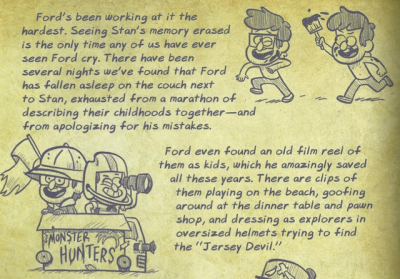
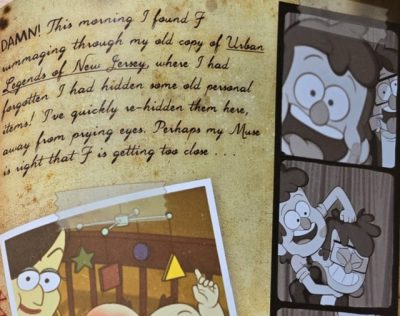
And a picture of teenage Stan (as seen below), too! You would think he would just attach himself to the idealized version of baby Stan in his head to feed his nostalgia and completely ignore teenage Stan, the traitor, the one who destroyed his science project. But no, Ford wouldn’t be Ford if he acted consistently about Stan. The funniest thing to me about the ripped yearbook page is that it implies Ford made the conscious decision to include Stan as he ripped the page off, when he could have just focused on his own picture. And then we also have his drawing of Stan, a perfectly accurate portrayal of Stan’s face as he got kicked out, implying that not only he paid an enormous amount of attention to his brother and how he looked like back then (after he closed the curtains), but that particular image was living rent free in his brain. Very vividly. With details.
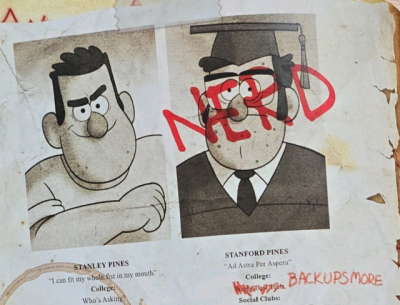
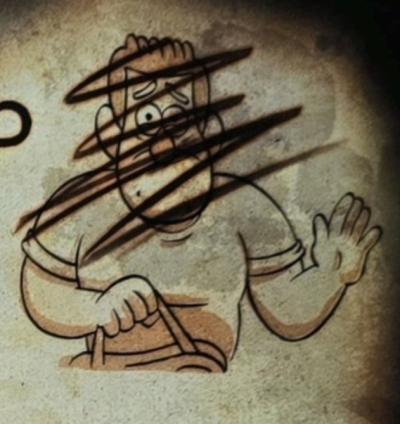
Now, folks, do we have any doubt whatsoever of the power Stan had in Ford’s psyche? Seeing that this is how the bedrock of Ford’s mind looked like? The boat, the swing set? I’ve seen it suggested before that these items represent Ford’s greatest regrets—I don’t know if I fully agree with that take, seeing as the swing set is fully intact, unlike in Stan’s mind, but one thing is true: they represent what Ford deep down thinks is most important, and two of three are directly related to Stan. Even the portal, from a certain angle, is connected to Stan.

Now, another thing that I believe to be related to that, is the claim that Ford didn’t spare Stan a single tought in the many decades they went separated. But here is Ford, casually confessing that he spent the last thirty years thinking of Stan:

But back to pictures. According to Alex in the commentary of Weirdmaggedon 3: Take Back the Falls, that picture of Stan has always been in Ford’s coat pocket, through all the decades, even before Bill’s betrayal. That’s why it’s so damaged. He was dimension hopping with it. I don’t think I even need to make any comment here, hahah.
I almost imagine if McGucket found that photo in his, you know, coat while they’re working on the portal or something... [imitating Fiddleford’s creaky voice] “What’s this? What’s this here?” And Ford says, [imitating Ford’s deep, very serious voice] “OH, yes. That’s a very important moment, that’s when I, um, first decided I wanted to be an adventurer.” [...] There would be NO reference to... the real reason he’s keeping it [...]. “Oh yes, this is about, uh, science, as a horizon, as a frontier to reach towards. You know, like a boat, like a ship, like science. It’s about SCIENCE!”

Ford’s protectiveness:
Stan Pines is very much ones of Ford’s weaknesses. Ford knows this and accepts this with shocking ease. How so? Well, first of all, the nightmare he had. As he tells us about it in Journal 3, even though he attempts to make light of the situation, his hand is clearly trembling as he writes, making drops of ink splatter on the page. The climax of his nightmare, the peak, the scariest moment was when Ford realized he was not the one at risk; rather, Stan was. “I realized my hand wasn’t chasing after me at all—it was chasing after my brother, and it was going to squeeze him to death!”And then, may it be noticed, there was no hesitation whatsoever on Ford’s part about whether to save Stan or not, nor does he try to hide his protective reaction. It was immediate and instinctive. “I tried to run to help him, but my feet were frozen.” It’s very telling that the Dream Hipster, the nightmare inducing ghost, thought that Stanley Pines would be the most effective thing to make Ford shake in his boots. Not even, say, failing and being ridiculed by other scientists, considering how ambitious he was.

And you know who else has noticed this weakness? Bill Cipher, of course. After psychologically, emotionally, and physically abusing Ford in horrific manners (including but not limited to: forcing him to eat spiders, driving a nail into his hand, and making him wake up on the snowy roof of the Mystery Shack as a symbolic threat of forced suicide), Bill involves Stan, as the grand finale. “But then he crossed a line.” Why was Ford’s brother that line, after everything Ford himself went through? “No. He wouldn’t.” Ford couldn’t even believe Bill’s audacity in involving Stan, even though he very much already knew Bill was as evil as evil could get. Because Bill knew, having free access to Ford’s mind, how terribly important Stan was: the person Ford loved the most in the world, more than himself.

You could still argue, then, that Ford wasn’t very protective of homeless Stan. After all, how could he have allowed his brother to be homeless in the first place?
Simple: he didn’t know. There’s a lot of things about mullet!Stan that Ford didn’t know! From canon, namely TBoB and Journal 3, we can deduce that Ford didn’t think of him as homeless, thought he was doing well for himself, living a well traveled charlatan/adventurer’s life, perhaps even a friend/member of the mob:


As Stan was kicked out, he told Ford (and the rest of the family), “Fine! I can make it on my own! I don’t need you! I don’t need anyone! I’ll make millions and you’ll rue the day you turned your back on me!” The way I see it, Ford took that at face value. Stan didn’t seek Ford out in those ten years, either, presumably out of a mix of pride, shame and self-hatred, so Ford could only assume Stan truly didn’t need him. Despite the many, many crossed out mentions of Stan in Journal 3, I think Ford at least tried to not let his mind linger on thoughts about Stan too much, because that hurt.
In his most recent interview, by HanaHyperfixates and ThatGFFan in 2023/2024, Alex talked about Ford’s issues:
He’s aloof, and distant, and he’s too perfect. And it’s like, “oh! I think he’s also aloof and distant from himself.”
I think he is, uh, deeply deeply hiding from his real feelings about things, because at some point early on, he decided that he could run from hurt by achievement and by creation, and has dug that hole so deep that he has no relationships.
If he sees achievement and creation as distractions from his real feelings, no wonder Stan didn’t get a call (or a postcard) from him earlier.
We also have Ford’s condescending, but protective, attitude towards Stan in TBoB as he considers asking for his help. Condescending protectiveness, if you will:

Notice how Ford briefly looks at Stan when Stan rants about his life:

A very ☹️ face. He’s probably surprised and concerned about what he’s hearing.
And then Stan, unfortunately but understandably, starts insulting/accusing him of selfishness:
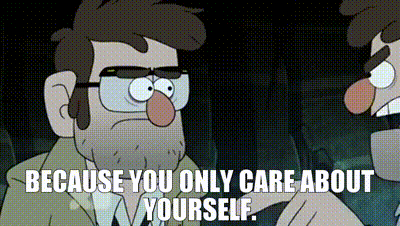
You can notice the ☹️ face slowly becoming 😠 as Stan started attacking.
Again, when Ford accidentally hurts Stan by branding him:
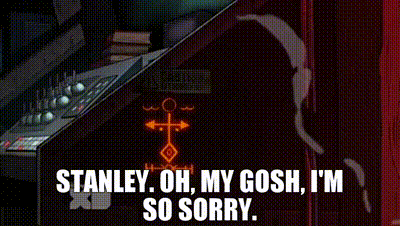
That’s not even ☹️ anymore, it’s almost 😩! Things would probably have deescalated and perhaps even been fixed if Stan, unfortunately but understandably, hadn’t punched Ford in the face as retaliation.
“Oh, but what about old Ford kicking Stan out after everything, then?”
I think a lot of people who talk about this moment operate under the assumption that Stan was, well, completely and thoroughly screwed if Ford followed with his original man. An old man, no place to go, no money...
But Stan did have money. A lot.
No, really, he had, per his own words, in the extra commentary of Land Before Swine:
I do have a son, Benjamin Abe Hamilton Washington. This pile of money I’ve collected over the years! That’s my true family. Y’know, I can sorta glue it together into the shape of a child, maybe… Eh, I dunno. I do my best, right? And I do have—I do actually—not to brag, but I have an obscene amount of money. Uh, y’know, all the years of collecting and etcetera—and also grifting!
I’m not defending Ford’s actions here. Ford is my favorite character, but I’m not a Ford defender, hahah. You could still argue that what he did was an ungrateful, jerky move, and I would agree. I’m just against painting it as a “Ford doesn’t care at all about Stan’s safety” moment. Especially because, when Ford told Stan he wanted his house back, sufficient time had already passed. Enough for Ford to change his clothes, visibly, and enough for them to have had a talk, in which Stan could have revealed this little fact about himself.
Another thing I’d like to address is that Ford doesn’t hesitate at all to save Stan when he gets into trouble and acts natural about it, which is way more that we can say for Stan (as seen by how Stan reacts when Ford is kidnapped by Probabilitor the Annoying and when Ford is turned into a golden statue by Bill):
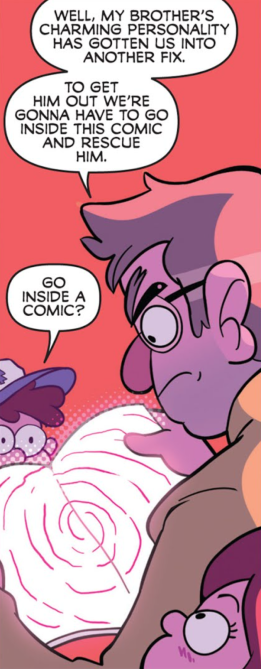
Again, not saying that Stan wasn’t justified in not wanting to help/save Ford after Ford’s blatant ungratefulness (I’m also sure he didn’t know Bill was actually torturing Ford). Not the point.
Now, back to Bill.
What I always loved about his little victory moment in Weirdmaggedon 3: Take Back the Falls is that upon surprising his enemies with his appearance, he proceeds to turn everyone into tapestry, including even Fiddleford (whom we know Ford cares a lot about!) but forces himself to spare Stan and the kids and place them inside the cages, even though they didn’t know the equation and would have zero usefulness to him. That could only be because he thought he could use them against Ford, so Stan was obviously included (instead of turned into tapestry or outright killed) for that very purpose. From a Doylist perspective, of course they couldn’t have excluded Stan, since he was one of the main characters; for the sake of character analysis, though, this is the best explanation in-universe.

That is why, when Stan-as-Ford tells Bill, “My only condition is that you let my brother and the kids go!” Bill easily believes him. Because he thought that it would be in-character for Ford. And Bill wouldn’t be wrong, not at all. He wouldn’t, because Ford himself was the one to tell Stan, just a moment earlier: “We need to take his deal. It’s the only way he’ll agree to save you and the kids.” It’s blaffling to me how many fans seem to forget Ford’s own words, and the fact Ford was very, very much willing to damn the whole universe (with seven billion people living on Earth at the time) to save three (3) people, including Stan. That Stan himself was the one to oppose and stop him. I think that happens because people buy Ford’s facade of Cold Responsible Greater Good Guy, which couldn’t be more deceiving. At this point I’m begging you guys to look deeper!
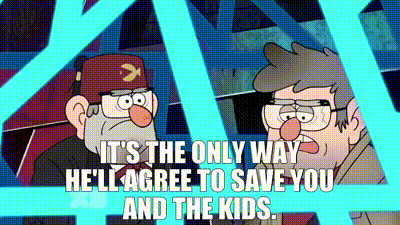
One common misconception about Ford’s character—not only Ford, but many, many fictional characters I have had the pleasure of considering blorbos—is that people take his facade at face value and judge him based off that. You’re falling for his bullshit. You’re looking at Ford and seeing exactly the man he wants you to see, instead of the man he is.
Ford demonstrated being hypocritical many, many times through the show, the comics, his journal, and even TBoB. I would go so far as to say it’s a Known Personality Trait of his. He chews Stan’s ass for being selfish, reckless, a criminal. Then proceeds to be: selfish and completely unaware of it, ten times more reckless, and a much more dangerous kind of criminal. He reproaches Stan for risking the world for only one person, but would have done the same thing.
Now, the last point of this particular subject: Ford and the erasing of Stan’s memories, which is sometimes interpreted as Ford prioritizing the greater good, or the kids’ safety, over Stan.
Dear reader, Ford erased Stan’s memories because he had literally no other choice. This is what Ford said to him: “He’ll be able to take over the galaxy and maybe even worse, but at least he might let the kids free.” Emphasis on the might, here. Might! Perhaps! Maybe! Perchance! Ford, in this line, was referring to Bill’s immediate threat to the kids’ lives—Bill had, after all, ran after Dipper and Mabel with a terrifying threat of disassembling their molecules as their grunkles were forced to watch inside their cage, powerless to stop him. After reflecting about their whole situation, he included Stan’s safety in the deal, too, now more certain than ever about his decision to sacrifice not only himself but, in his own words, “the galaxy” (and later, “the universe,” as he was pretending to be Stan) to, again, perhaps (!!!) save his family. Ford had literally no guarantee Bill would follow through with his words. Given Bill’s track record, it was way, way more likely that he wouldn’t. Bill is a liar and a manipulator through and through, one who takes great enjoyment in people’s suffering. Ford’s suffering, specifically, above all, since TBoB painted Bill as this toxic and possessive ex obsessed with his pet scientist. What were the chances?
Even if Bill, through some miracle, did end up keeping his word, we saw Bill’s plans for Earth in his daydream fantasies: taking a bite off the planet, drawing a smiley face on its surface as millions died... What a guy, that Bill! If the Earth was wrecked beyond repair, where would Stan and the kids live? How would they survive among all the chaos and destruction of the literal apocalypse? With nightmarish creatures lurking in every corner? With what food, what water, what shelter? Answer: they likely wouldn’t. The probability of human survival would be abysmally low.
Ford, tragically, had no other choice but to sacrifice Stan’s memories. It was that or risking the possibility of having to watch his family, including Stan, die horribly painful deaths at Bill’s sadistic hands or to condemn his family, including Stan, to a slower but still certain death after the entire human race perished.
Ford being aware of his love for Stan:
I have faith that most people already knew, to some extent, that Ford never stopped loving Stan, even at his angriest. A much lower percentage of these people, I believe, know that Ford himself was very much aware of that, and not in denial at all. He never even thought he hated Stan.
First, I choose to point out how young adult Ford, still in college, with his bitterness and resentment still very fresh, admits to missing Stan. He wrote, “MISS YOU” in their Bro Code, the code he memorized and never forgot. He not only thought about Stan, which would be understandable, since all of us have intrusive thoughts, but he took the time to write it down, and in code, which would be even more difficult than just writing it in English. That requires at least some level of acceptance. You may not be able to filter your thoughts, but you are able to filter your writing.

Ford does attempt to filter his writing, I know, by crossing out a lot of lines in Journal 3, most of them about Stan. But he does not cross out all of it. He freely admits to having a nightmare about Stan, to wanting to protect Stan from the giant six-fingered hand, to having the lake as his favorite place, to missing Stan. I think that Ford, if asked about his love for Stan back then, would also freely admit to it, as well. Stan is his twin brother, so of course he loves Stan.
One thing that always caught my attention is how Ford still refers to Stan as his “family” in the Journal, even after Stan’s attempt to disown him. Stan makes it pretty clear that, from now on, his “family” is just Mabel and Dipper:
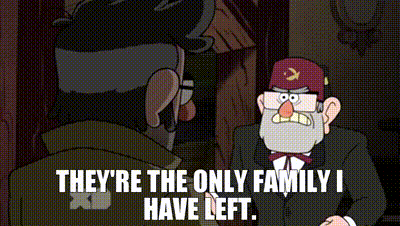
Days after this, Ford didn’t seem to have taken this to heart, as seen by what he wrote in his Journal:

It’s way more likely than not that he IS including Stan, here. He says “the rest of the Pines,” instead of just “the children” or “the kids” or “the twins,” and even singles out Dipper as someone he trusts (contrasted with Stan and Mabel, whom he doesn’t).
I wonder if that’s just Ford being stubborn or if he really thinks his relationship with Stan is in a somewhat better place than it actually is.
I mean, for instance, this is their swingset (symbol of their relationship) in Stan’s mind:

And here it is Ford’s mind:

Still ominous, but very noticeably intact.
It’s ironic—I think that Ford was aware of his own love for Stan, but not aware of how damaged their relationship was from Stan’s POV.
Ford and stubborness:
I’ve also seen people saying that, if Stan hadn’t sacrificed himself, Ford would have continued, quote unquote, “hating” him. Or that his happy ending with Stan was a byproduct of his guilt over the same sacrifice, and not out of a genuine desire to reconnect with Stan. According to Alex’s commentary on this scene in Weirdmaggedon 3: Take Back the Falls, that isn’t true, either:
This whole sort of conclusion here is—what we needed to happen in this scene was—we needed pressure to be at the point where Stan and Ford recognize their lifelong rivalry and Ford does a sincere apology to Stan. And almost more importantly, he acknowledges Stan’s intelligence. Like, he says, “you wouldn’t have fallen for Bill’s nonsense,” like, he recognizes his brother has a kind of intelligence that he doesn’t. [...] And even though it’s Stan who agrees to—“I’ll be the one! Erase my mind! It’s fine. It’s worth it.”—like, it’s a sacrifice for both, like, Ford at this point is willing to get his brother back and has to lose him again. Like, both of them were... just doing what they have to do here.

This means that Ford was already wanting to reconnect with Stan before Stan offered to sacrifice his own memories. His comment about how Stan wouldn’t have fallen for Bill’s flattery wasn’t just self-reproach or some comfort to Stan, but a conscious attempt to soften things between them.
Which also means Stan’s offer to sacrifice himself wasn’t actually necessary for Ford to forgive him (or switch the blame entirely, more like, and start blaming himself instead) but just came at the worst possible moment. It was too late for them, now.
Reconciling Ford’s love for Stan with his treatment of Stan:
Now, we arrive at the last problem, which is something I’ve seen a lot of people struggling with. How to even reconcile Ford’s love for Stan, something we see hints of again and again, with his treatment of Stan?
First, this infamous line in Journal 3, which is arguably the most vicious (towards Stan) Ford ever was in canon:

That’s probably also related to Ford’s control freak tendencies. If Ford admits to himself he is not in control, that he needs help from other people, that he is really that desperate... Well, he can’t admit that, so he rationalizes his way out of that conclusion by convincing himself he would be the one doing Stan a favor (offering him the chance to prove himself to Ford), and not the other way around. He doesn’t need Stan, he doesn’t need anyone; Stan is the one who needs him and his forgiveness. (This is the moment I get the urge to reference a manga protagonist with a very similar control freak mindset, Light Yagami from Death Note. Why am I always attracted to characters with deep cogntive dissonance issues who desperately shape their own narrative to convince themselves of their full control over it? Like a moth to a flame.)
Don’t get me wrong, I do believe Ford looked down on Stan—on people in general. There’s plenty of evidence for that in both Journal 3 and Word of God, if you count Word of God as evidence. Ford himself admits to that after Weirdmaggedon. And let’s not forget what is probably the biggest elephant in the room, the 2016 TVInsider interview (if you’re nerdy enough to read such a long meta, you’re likely nerdy enough to have seen this quote already):
In terms of Stan and his brother’s conflict, we always wanted a moment where Ford saw that he was wrong. Ford’s spent an entire life imagining himself as this lone solitary hero and imagining his brother as this bumbling leech. From a narrative point of view, for Ford to see Stan be the hero finally lets Ford see the true side of his brother that he’s been too blinded by pride to see.
Ah, yes. Ford looking down on Stan enough to think of him as a “bumbling leech.” To most people, this sounds way harsher than “selfish jerk,” the term Ford himself used in Journal 3.
Fittingly enough, that was in the same interview Alex said Ford would have deserved to lose Stan:
If Stan had lost his memory for good, that would [have] provided some interesting narrative places for him and his brother to go, but ultimately the show is about the kids. Stan and his brother are meant to be a parable [that show] what can go wrong in a family relationship, [but also] show that, with hard work and sacrifice, the riff can be repaired. If Stan’s memory had been fully erased, it wouldn’t punish him so much because he’d be gone, but it would punish Ford, Dipper and Mabel most. Even though Ford might deserve that punishment, Dipper and Mabel do not.
The interesting thing here, though, is exactly that: losing Stan would be a punishment to Ford. Why? Because it would hurt. Why? Because Ford loved him. Enough, it seems, that he would suffer more with it than Stan himself would.
I think what confuses people so much is that they conflate love with like with admiration with trust with respect. They think of it as the same thing—a confusing, amorphous mass of positive feelings towards someone.
The way I see it, though, Dipper was someone Ford loved (considering love a deeply rooted, complex emotion), liked (felt general fondness/amiability towards), and trusted (to be capable of handling all the mystery stuff). Mabel was someone he loved (she was family), liked (she was weird and creative and pure-hearted!), but didn’t trust (due to his constant projecting; before anyone attempts do deny this, I’ll remind you that Ford himself admits in Journal 3 that Dipper was the only family member whom he had come to trust). Stan was someone he didn’t like nor trust, not anymore, certainly didn’t admire and—let’s be honest—barely respected (or didn’t respect at all, depending on your point of view), but still loved with the fierce intensity of one thousand suns.
I do believe Alex is at least mindful of the difference between love and respect, as seen by his commentary on Stan’s condescending love for Mabel in Land Before Swine:
But this idea that Waddles is sort of a metaphor for what Mabel loves. And Stan loves Mabel but he doesn’t—he doesn’t really think that anything she thinks is necessarily smart or right. You know, he loves like her, ah, she’s my sweet niece, but [Stan’s voice] “she doesn’t know anything.”
In the same interview by HanaHyperfixates referenced earlier in this post, Alex revealed his view of the Stan twins’ relationship:
Those characters at sea—it was so rich. They’re really really funny, because they both have major major blind spots. I can kinda write stories about them as a duo forever, because you can always excuse them both getting hyped on a bad idea for their own reasons, and then you can always come up with a reason for them to disagree about it, and it’s always sweet to see them come together again, because they’re so full of themselves, but they are also both so damaged they desperately need each other.
As you can see, the codependency is genuinely mutual, not something imposed on poor, guilty Ford after Weirdmaggedon. One thing I find really interesting about Ford is his black & white mindset, the fact that the only way he knows how to be with Stan is a codependent way. They’re either separated and estranged or sailing completely alone on a boat for the rest of their lives. Either rivals or best friends forever. There’s no middle ground for him.
Dipper tells us in Journal 3: “Still, it’s taken about a week of intensive scrapbook therapy to get Stan fully back to himself. [...] Ford’s been working at it the hardest.” Ford was the one putting the most effort in getting Stan back. Despite all, I believe Ford is the person who loves Stan the most. Not the one who loves Stan better—that one would be Mabel, I believe, or Soos, who are non-judgemental and understanding. But Ford is the one who loves him with the most intensity, which is fascinating because for most of the show he doesn’t even know how to love Stan, as exemplified by his treatment of him. Too fierce, too selfish, too much of everything.
*flips a table* I’M HERE FOR YOU
I actually got a lot of thoughts about it so it’s gonna be a long post, sorry
(It’s been a while since I watched Broadchurch so maybe I forgot some things)
I understand that Tom seems to be wrong for the viewers. He thinks his mother is the guilty one and not his father when we know that it’s the other way around. But.
But we tend to forget what this child has gone through in season 1. His not-so-best friend has been killed. It could have been him. He feels guilty (he deletes anything that could be an evidence) and he doesn’t want this case to have anything to do with him. The less he knows, the better he is. His biggest fear is to be accused of something or to be responsible of Danny’s death without knowing it.
Plus he is very close to his father. We know that Joe is a stay at home father because Ellie’s job is time consuming.
And here he learns from his mother that his father is the murderer. And he can’t believe it. Because it’s his father, because it was one of his friends (he has to picture his father and a child that was his best friend being close in a so wrong way. That must be awful), because it can't be
So Ellie must be wrong. His mother must be wrong. And how dares she accuse her husband, his father? How cannot she see that there’s a mistake somewhere? That his boss, that horrible boss, must be wrong?
For a 10yo child, it’s way much easier that way (and it’s even more obvious when Joe pleaded non guilty. His father would never have lied. And Joe seemed to be such a nice guy).
That’s why he is so mad at Ellie at the beginning of season 2. Because he wants his father to be innocent, and Ellie was the one to arrest him. She is the guilty one (and it is one of the main themes of the season 2, specially when Ellie has to testify and she says “I’m not the guilty one!” because she feels a lot guilty). It makes a lot of sense with his character, but as viewers with a lot of empathy for Ellie, it seems very unfair (because she deserves so much BETTER)
So that’s my thoughts on the matter ☀️
so I'm re-wtaching Braodchurch and I just entered season 2 and got to the bathroom courthouse scene, we know that Tom refuses to see his mother and Ellie mentions that he blames her but I can't really understand why? Like why would he blame his mother when his father is the one who is a literal murderer?
Could someone please like analyze this or tell me your thoughts/opinions on the matter, I'm really curious to hear what people think about this kind of situation
Something I find interesing abt Pomni's character is that, at first, bc of her reaction to being transported to the digital Circus, it was plausible to think she is the "always done with everyone's shit character", but its actually very cool for her to be the character who has shown to be very much empatic, she actually cares
And better yet, to have a full comparison of empaty VS sympathy, like Ragatha. Ragatha has shown sympathy multiple times in the series, but actual empathy? Its very much show in ep 4 that she actually uses this mask of sympathy towards others bc she is a people pleaser, Idk if she really cares (Ofc that doesn't mean she is a bad person, but its hard to feel you really care abt other people situation when you cant actually put yourself in their shoes, i talk from self-experience), she cant actually put herself in their places, like when she tries to confort pomni but forget she is a whole ass adult, not a child.
Idk I love how that difference is made and how important that is to their characters
Some of the responses to my last post have made me realize that maybe Bakugo's trauma isn't as well understood as some of the other characters', and, because I have free time today, I figured I might as well break it down in chronological order and work from there (warning you now: this will be long).
To begin with, there's a lot of obvious things about the Sludge villain incident that would be traumatizing for basically anyone. And as much as Bakugo tried to shove off the after-effects, we know he was scared:

But there are a lot of Bakugo-specific reasons why the Sludge villain really fucked with his confidence and sense of self-worth. For one thing, while we see Midoriya getting attacked, he's rescued by All Might almost instantly. He barely has time to realize he's suffocating before he's free. Bakugo? Not so much. It's unclear how long, exactly, the Sludge villain holds him hostage, but it's at least a few minutes. Which doesn't sound very long until you remember that Bakugo was fourteen, couldn't breathe, and, because he isn't stupid, was completely aware that multiple pro heroes were basically standing around watching him be brutalized and doing absolutely nothing to help.
The only person who did help was Deku. The only person. The only person who gave enough of a shit about Bakugo to try and save him was the person he has the most complicated relationship with: his rival, his victim, his childhood friend, the person he feels both the safest and most exposed with. The person he measures himself against constantly, and internally finds himself lacking. So not only is all of this happening, but Deku—who just hours earlier Bakugo was mocking for being weak—is the one person strong enough to try and do something, and gets front row seats to Bakugo's own weakness.
Then All Might shows up and saves Bakugo from what is, at that point, the most humiliating, terrifying thing that has ever happened to him. But of course Bakugo isn't happy about it; he never wanted to be saved by All Might, and meeting his hero for the first time the way he did? What Bakugo wanted, desperately, was to prove himself to All Might, and instead he's just another dumb kid that got saved from a villain attack by the greatest pro hero who ever lived.
Not only that, but this was in public. It was televized. Bakugo was made so famous for it, people recognized him years later on the street based solely on his face. And while theoretically that's great exposure for him, imagine if the worst, most degrading moment of your entire life was broadcast on live, national television, and constantly brought up like some funny anecdote by people who don't even know you. He was fourteen years old being physically assaulted and strangled in front of the entire country and unable to do anything about it. Not only did that damage his pride, but it really fucked with him mentally. Look at what Midoriya even says about him:

That's not even to begin talking about how much pressure he puts himself under to be the best, no exceptions. He has a full-on panic attack when he loses in Deku vs. Kacchan 1 because he ties his self-worth so completely to winning he thinks of himself and worthless without it. Look how deeply it affects him:


That's not just bruised pride, that's Bakugo dealing with every single one of his insecurities being laid bare in public again. It's gonna just keep happening, too. And sure, like with this fight, sometimes he brings it on himself, but. Holy shit, this poor kid.
Then, of course, we have the kidnapping.
Despite their misapplication of their information, the LoV actually understands Bakugo pretty well. By that I mean, they figured out what affects Bakugo the most and capitalize on it to try and win him over to their side. They attack his image as a hero. Which seems kind of lame and generic, except it really hits home. Why?
Because that's his biggest insecurity, his deep, dark shame: Bakugo doesn't think of himself as heroic.
He's an excellent fighter and strategist, he's fearless, able to work well under pressure, adaptable, quick-thinking, and extremely powerful. All incredible traits for a hero. What he doesn't have is an instinct to save others. Deku does; he'll reach his hand out to anyone, without thought, no matter the cost to his safety/happiness. But Bakugo consistently struggles with this aspect of being a true hero. He's very aware of how important it is—every time he talks about Deku looking down on him, the thing he was laughing at Bakugo for? Yeah, this is it—and how very much he lacks it. And the LoV rubs his face in the fact that not only do a bunch of villains see him as being villainous, but the public he's supposed to be well on his way to protecting do, too. Yeah Aizawa defends him, but of course that whole experience negatively affects Bakugo. Especially because of what comes after.
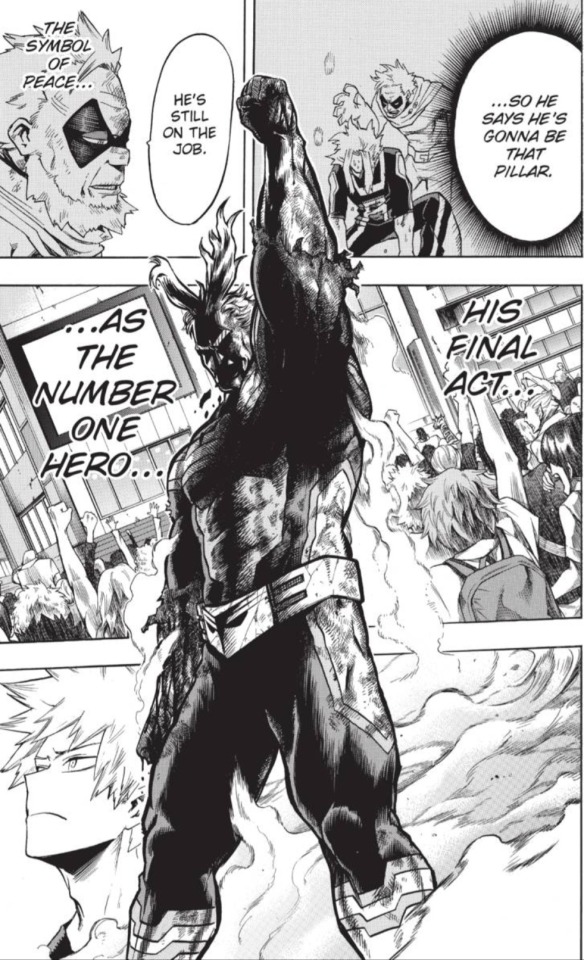
Deku vs. Kacchan 2 is probably the closest Horikoshi comes to stabbing the audience through the brain with a knife labeled "Bakugo's trauma".
The whole fight is just Bakugo baring his soul in the most raw, heart-wrenching way possible. Look at what he asks Deku:
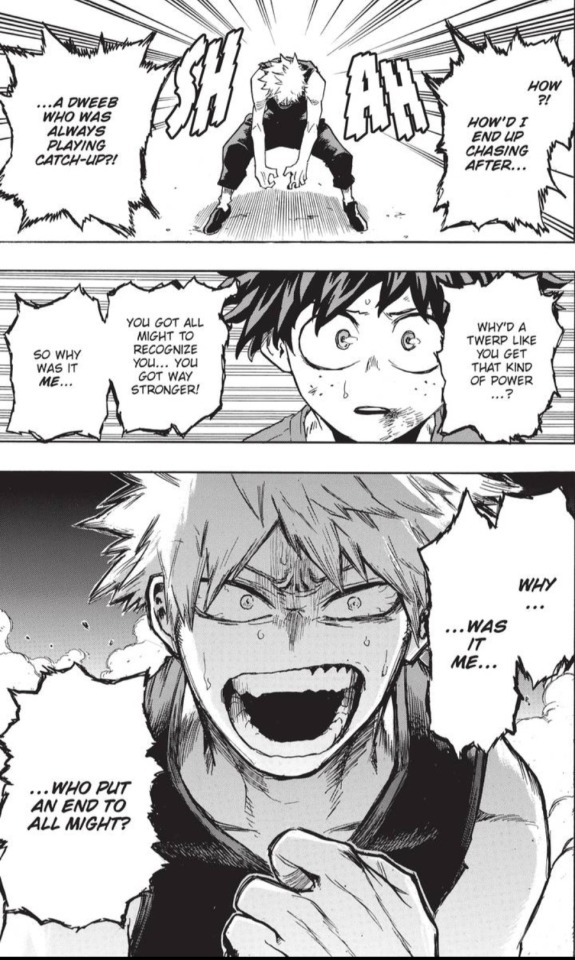
None of these lines should be ignored. This is Bakugo admitting that he is terrified that every bit of praise he's ever received is meaningless in the face of reality, which has proven that he is not worthy. All Might didn't think so, otherwise why wouldn't he have picked Bakugo to be his successor? Every ounce of skill, all the effort Bakugo has poured into his dream, it all means nothing. Why? Because Deku is inherently heroic, and Bakugo is not. Bakugo knows it, Midoriya knows it (why else would he be laughing in Bakugo's face if he wasn't intimately aware of his failures?), All Might knows it—hell, the whole world knows it. And because Bakugo is his own worst critic, he's gutted that someone like him, someone unworthy, destroyed the Symbol of Peace. His hero.


Does this not look like trauma? Does this not look like a kid poorly dealing with PTSD who's lashing out and trying to punish himself? And trying to purge his emotions the only way he knows how, through fighting? Who is desperately seeking some kind of compassion and connection in Deku, because he is losing his mind and can't keep going? He's a kid who's been given basically zero support, who's been expected to deal with not only being kidnapped and psychologically tortured, but also being the direct cause of Japan's sudden criminal uprising. That is so much pressure to put on a child. Any single bit of Bakugo's experience would be traumatizing by itself, but put together? It's like a personalized hell for him.
And then we have the Moment. The my body just moved on its own moment. Bakugo is so afraid for Deku leading up to this:

And afterward? It really affects him.

He's scared for Deku. He's beating himself up for not supporting him better, for not getting over himself and taking Deku's hand. He thought his closest person was going to die in front of his eyes, and then that person ran away. Of course that traumatized Bakugo.
Now, the reason Bakugo's trauma often gets overlooked (both in canon and in the fandom space) is, in my opinion, because he doesn't express his trauma in a way that's easy to romanticize. It often comes out as anger and violence, loud and obnoxious and toxic. His trauma responses hurt other people, specifically Deku. And in a character that isn't going for poor little meow meow bloodthirsty vengeance-based criminal or abused child with terrible social skills but a heart of gold, it's hard for people to wrap their heads around the fact that Bakugo isn't really a bad kid so much as he's a kid who has had a lot of crap dumped on him and hasn't been given any tools to heal. He doesn't know how to express his feelings easily or clearly when he isn't in the middle of a fight, and he has very few coping skills to help him deal with his crippling self-loathing and inferiority complex. So when he reaches his mental limit, he—pun intended—explodes.
That isn't to say that Bakugo isn't responsible for his trauma responses, the same way every other character is. He absolutely deserves to be taken to task over them, and the narrative has done a good job of giving him one consequence after the other. But at the same time, he really is just a child who is doing his best in a fucked up situation. And while his actions definitely have hurt other people, the amount of mental torment Bakugo finds himself in on a regular basis deserves more sympathy than I think he sometimes gets.
I understand why characters like Shoto get more of the poor baby treatment, because he's the perfect victim: faultless, and his anger is almost 100% directed at the perpetrator, his father. Comparatively, Bakugo's trauma is messy and overflowing and directed at all the wrong people. But that's neither unrealistic nor even all that surprising, given what we know about him. And part of that is because his trauma isn't nearly as straight-forward, since it's so wrapped up in his own self-esteem issues that he blames himself, and then tries to refocus his hurt and anger on Deku to mitigate his own pain.
It's a big part of why I like Bakugo so much; he represents the unappealing side of trauma responses that are so common, but so often get overlooked because they're unappealing. He's a victim who doesn't act the way we want a victim to act, but rather the way they usually do, and for that I applaud Horikoshi on his realism.
This is why I like character driven plots, there’s reasoning behind everything a character does that’s tied to who they are as a person, and you can see that used to great effect in Aurora.
It really helps too that these are very clearly multifaceted individuals with their own strengths, weaknesses, similarities, differences… they are their own people and it’s really interesting to see that, not just in how they contrast each other in their responses, but in why and who they are even before we know anything about backstories for 2/4.
It’s just good writing my man.
What did Kendal tell the others? Why has Falst jumped to the conclusion that Kendal has to be broken out immediately and is being used as a hostage? Why are they so on edge if theoretically Kendal will be released once they leave?
The gist is that he's being imprisoned until they leave, don't freak out, it's fine. Pretty simple message.
Erin recognizes a power play when he sees one. Zuurith has snatched and imprisoned Kendal, and even if he's supposed to be released once they leave, it's not ideal. Erin does not have the authority to challenge Zuurith directly over this, and if he tries, he risks dragging Asera into an actual intercity conflict. This puts himself and Kendal squarely in the sights of Asera and the mage academy, something he's trying to avoid until he's got his own business more under control. He also risks drawing attention from the Paladins if he does anything too dramatic. Erin needs to trust that Zuurith will release Kendal as promised, because if the diplomatic option fails, his only other options have catastrophic collateral impact.
Falst recognizes an abuse of power when he sees one. Kendal is a lot like him in some ways. Falst knows the security a city provides is conditional and easily misused to harm people the city doesn't like. With Kendal imprisoned, no matter how diplomatic they claim the process is, Zuurith now has leverage over all of them, and is clearly using leverage over Kendal to keep him restrained. This city has made its intentions very clear, so it's time to defend themselves. Underneath, he also deeply dislikes the indication that if he was in Kendal's position, Erin wouldn't hesitate to leave him behind.
Alinua is torn. She knows that this isn't something she can fight. She's not a diplomat, she's not even halfway experienced with nuanced social situations, and Kendal specifically told her this is his problem to solve because nobody else can. All she can do in this situation is brute force and divine fiat, and brute force will cause more problems than it fixes. But she hates leaving Kendal in this situation, especially since she knows his self-sacrificing habits make him an unreliable judge of how much danger he's actually in.

Remember Mikey's touching speech in Samurai Tourist?




It's strikes me that it's not just Leo that does this - taking on a role in the family so the others are free to do their own things. I'd argue they all do it.
Donnie almost entirely shoulders the maintenance and security of their lair (though I like to headcanon that the others help out with chores. We see Leo doing some welding in Tale of Master Yoshi, for example). This frees up his brothers to enjoy their hobbies - Mikey to read his comic books and play video games, Raph to tinker with his bike and hang out with Casey, and Leo to read and meditate.
Raph strikes me as the Guard or Shield of the family. Especially on missions, he's the one that watches their backs and keeps them all safe. Which leaves Leo free to focus on the strategy and overall logistics, Don free to let his big brain tick over the science and Intel they need, and Mikey free to bring some levity to the situation so the stress doesn't get on top of them.
And Mikey? I'd argue that Mikey's intentionally the goofball of the family. He's far from oblivious, as the above quote shows. I think he deliberately adopted the persona of the 'clown', in order to make his family smile and relieve the tension that having 3 very intense brothers tends to foster. Mikey's busy being the 'funny one', so his brothers don't become snowed under with their own heavy thoughts and self reflections.
I am not sure how much you are into analysis but I want to ask. Do you think raph isn’t as good of a fighter compared to his brothers? because I have a feeling either he’s holding back when sparring with them over fear of harming them or he’s not as good as them.
Anon, you just made my day because this gives me an excuse to nerd out at length. (Though apologies that it took me so long to get this fully written out and posted.)
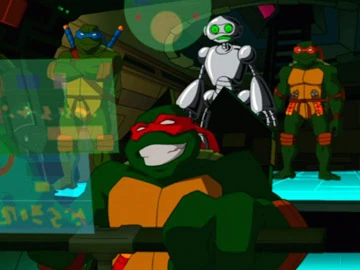
Disclaimer before I launch into it in full: to fairly compare Raph to his brothers I'm going to do a brief run-down of the three of them before breaking into the full details on him. A lot of this is built on extrapolation from details in various canons and at times might edge toward headcanon territory, though I'll be trying to stick with what's actually present.
With that out of the way--
Comparing Raph to His Brothers
So to start with, I can only fairly do this deep-dive by briefly touching on each of his brothers before getting to Raph himself. I'll say upfront that I think it's less a question of which one is the "best fighter" and more that they're each different types of fighters, each with their own strengths and weaknesses and which might land any of them in the position of "the best" depending on the circumstances.
Leo
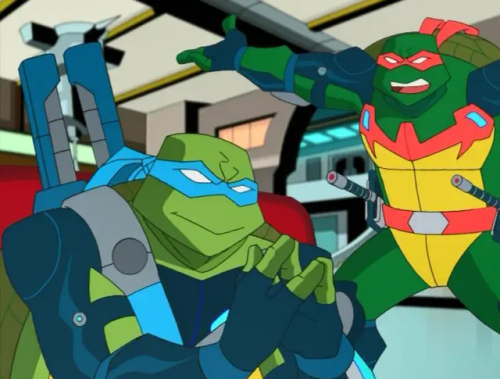
Strengths: This is an extrapolation based on various iterations (2003, 2007, 2012, 2014/2016, ROTTMNT, 2023, Batman vs. TMNT, and a little bit of the IDW comics), but Leo strikes me as a tactician-- as the guy who can extrapolate to fifteen different possibilities for the outcome of a fight and fifteen steps ahead of everyone else on each of those possibilities. At his best he knows how to play to his brothers' strengths, put them where needed, and let them go to do their own thing. He's also persistent and willing to put himself through his paces over and over again until he 'perfects' what he wants to learn how to do. As a "traditional" (romanticized) example of a warrior, he is the golden boy of the family. Rise Leo might be a little less likely to get every step 'just so,' but most iterations of him aim to be as flawless as possible in terms of his combat skills. In his ideal world, he will never have a misplaced swing of a sword or inflict any damage he doesn't intend to. That depth of knowledge and highly-trained skill can be damned terrifying for his enemies if it's taken to its fullest extreme.
Weaknesses: His perfectionism and desire to get things 'just right' is a double-edged sword. In the 2003 series it got wrapped up in his PTSD and the need to never make a critical mistake again (which... didn't work out well for him-- hi, shades of Raph at his worst); in the 2007 movie it led him to think his efforts to learn how to be a better leader weren't "good enough" and kept him away from home for two years; in the 2012 series it led him to ignore critical injuries and try to bully himself into being 'better' (when realistically what he did during the farmhouse arc probably would have permanently destroyed one of his knees); in the 2014/2016 movies it led him to temporarily damage his relationship with his brothers by spilling over the worst of his internal perfectionistic vitriol onto them; and in Rise it at times has turned him into a showoff who'll act without letting the others in on his plan (which can backfire horrendously in a worst-case scenario) because if he does it without telling others what he's going to do, then he gets bragging rights if it works out like he planned. Underlying all this is what could turn into an unmanageable case of anxiety depending on the version of Leo and how personally stable he is, as well as how susceptible he is to ruminating over where he feels he went wrong. To say nothing of how many versions of Leo have a GIANT self-sacrificing streak when it comes to their families. Under the right circumstances-- and if someone really intended to make it hurt-- they could easily play all that against Leo and get him to freeze due to overthinking. (Though getting him to that level would take an extreme case and some severe emotional damage to weaponize his guilt.)
Speed: OKAY. Here's where things get a little more cut-and-dried in my opinion-- if a fight is down to just speed anyway. Leo might be pretty neck-in-neck with Raph in terms of speed, maybe just a touch faster due to (generally) being more lean-built than Raph. Leo's not a tank; yes he can fight in close quarters or mid-range and hold his own, but if he can then he tends to be 'slippery' about it. He's not going to batter away at an enemy if he can spin out of range before darting back in and dodging whatever hits he can. If it's just a matter of speed without any other factors involved, then there's a good chance Leo will win in a fight against Raph. If it's a question of strength and endurance though... Well, I'll expand further on that when I get to Raph.
Adaptability: This is something that is absolutely dependent on which version of Leo we're talking about and how hung up that version is on his plans without taking the general chaos of life into account. 2012 and 2014/2016 Leo both are guilty of getting so hung up on the idea that their approach to a combat situation is the right way that they fail to plan for the fact that their brothers' ways of doing things isn't their way of doing things. Which blows up in their faces spectacularly sometimes. IF it's a version of Leo who's more likely to fail to take into account his brothers' differing styles, then Raph might easily play that against him and deliberately do things Leo would find unpredictable (though probably not as much as Mikey, lbr). For versions of him that are better about knowing that his own approach isn't the only/'best' approach, then Leo would be better able to roll with whatever Raph throws his way, within reason.
Combat Style/Approach: Mid-to-close-range, tactician, and definitely NOT a grappler. Yes, his skills and training have him moving with muscle memory when he needs to, but even so, there's a split-second awareness of what his opponent(s) could do and instinctively reacting based on what he's met with. A lot of that means he has to be free to move and avoid getting held in place, or things might go bad quickly.
Donnie
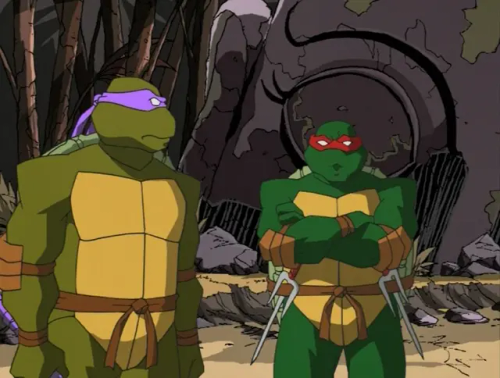
Strengths: No matter which iteration of Donnie you're talking about, you're generally talking about an engineer who's able and willing to casually heft up and carry around a car engine with his bare hands. And considering (with a quick google search) it looks like the average car engine weighs anywhere between 300 to 700 pounds, that alone is proof enough that no one in their right mind would ever want to be punched by Donnie. And considering there are instances where he's able to temporarily support the weight of himself and his brothers (a couple of scenes in the 2003 series are what immediately come to my mind, but that's just my favorite iteration showing itself) it's proof that he has that strength not just in his arms. To give you an idea of just how much weight that implies he can lift, here's a size and weight comparison of some of the largest turtle species currently living.*

Notice anything? Like how... Oh... I dunno... a 4-foot-long Loggerhead sea turtle can weigh up to 400 pounds? Or a 3-foot-long Leatherback sea turtle can weigh 550 pounds on the light end? (Note: this is not meant to be snarky or condescending, just a simple statement of fact that all signs point to these boys are fucking HEAVY.) And that huge amount of weight relative to their body size seems to be pretty consistent among turtle species from what I've seen with my digging around. Which logically implies that the same holds true for these boys, and if we play fast-and-loose with the idea that we can roughly translate length to height... well... For general weight of the boys, I tend to assume at least 200 pounds, at least for those under and up to about 5-foot-tall. For the 2014/2016 set I might even suggest somewhere between 400-500 pounds-- but roughly comparing weight to size with that table of large turtle species, I'm probably severely underestimating their weight all across the board. Being generous, hypothetically saying all four of the 2003 turtles are about 240, that then means there are moments in the 2003 series where Donnie is temporarily lifting around 960 pounds, including himself. AND THAT MIGHT BE A SEVERE UNDERESTIMATION. Terrifying, right? So yes, Donnie is unquestionably strong as hell and maintains that strength by working on his various projects, and a full-force hit from him would land someone in a hospital-- if they're lucky. The other main thing working for him is that he's a tech genius. No, he's typically not as rigid or disciplined in his training as Leo is, but if he has access to tech and distance then he has a whole host of weapons and traps he can bring to the party (something which Rise Donnie excels at in spades). Raph's a much more physical direct-confrontation fighter, but Donnie has the capacity to turn entire environments against his enemies, depending on the means he has at his disposal.
Weaknesses: For better or worse, Donnie's primary personal strength-- the one he leans on above all else-- is his intellect and being able to puzzle things out. And again, he's an engineer: yes he can lift and move that terrifying amount of weight, but he's usually not doing it at speed. (Because let's be real, moving heavy and potentially very breakable machinery is not something you want to do quickly when you want to be able to use or repurpose said machinery.) He's not a slouch when it comes to his ninjutsu training, but there's a reason why the concept of Donnie pulling the 'I'm too busy to train right now' is a widespread fandom concept. It doesn't necessarily mean that he's not 'as good of a ninja', but more that he's not a 'traditional' ninja and has had to adapt things to his preferred methods. Yes he has a lot of physical strength, but he prefers to keep a distance from his opponent(s) if possible. Doing so, having that distance, gives him more time to plan and respond-- because unlike Leo, a lot of iterations of Donnie don't have that ingrained ability to read the possible actions their opponent(s) might take and respond on a dime (or at least not to the same level). Raph's tendency to brute force things-- something which Donnie technically could do but clearly does not like to-- might be somewhat unpredictable for him, especially because that puts Raph in close and doesn't give Donnie as much time to respond as he would like. All that said, Donnie could technically win a fight against Raph without his tech if he pretty much said to hell with fighting and decided to do an imitation of an octopus. At the very least he could probably hold him in one place if he was quick enough and managed to get Raph's arms pinned. And somehow kept him from walking. (It wouldn't be a dignified win, but it might still technically be a win.)
Speed: I'm gonna be honest, I do not think speed is on Donnie's side in comparison to his brothers. If he really makes an effort (rather than just going his own route and pursuing his interests) he'd probably be able to keep up with the others going at full tilt for a little while, but he'd probably tire out first. A lot of the work he does due to his areas of expertise is fairly sedentary, and frequently he needs to move with slow and deliberate precision. There's a lot of fine muscle control involved in that kind of work (especially if it involves maneuvering something heavy), but being able to consistently do that doesn't automatically translate to being able to do something similar at high speed. But that's okay, because if he has the distance and varied means of attack he needs, then he doesn't have to worry about keeping up with his brothers for an extended period of time-- it just has to be long enough.
Adaptability: If it involves tech or computer systems, Donnie's ability to adapt to a situation is unparalleled. Give him unrestrained access to an unfamiliar and shiny (and incredibly pervasive) system and he'll be able to make it seem like a tech apocalypse is targeting one specific person if he wants to. If it's a head-to-head physical fight though, it really depends on how desperate he is or how much breathing room he has (or both). If he's frazzled and panicky then there's the possibility he'll miss several opportunities or potential tools and, in a worst-case scenario, he might freeze. (An extreme example of this is how Rise Donnie gave up fighting the crab men when his tech failed, after all his brothers had already failed in that fight.) If he has time and space to think then he's practically unstoppable, but if he doesn't have that breathing room then chances are things won't end well for him.
Combat Style/Approach: Distance fighter, brain-over-brawn, could be a grappler if necessary but uncomfortable enough with it that it might work against him, might as well dub him a 'trap master' for the little surprises he might leave in his wake if he's feeling spiteful. He's a schemer, but not a chess master.
Mikey
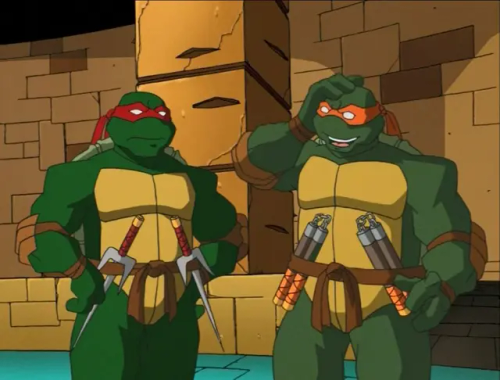
Strengths: If there's one thing that can be said for Mikey it's the fact that most versions of him are innately gifted at picking up kinesthetic knowledge, to say nothing of the fact that he tends to be the most spiritually gifted of the brothers. In fact in several series (2003 and 2012 off the top of my head, though I'm certain it may have popped up in others) it's briefly mentioned that if Mikey really buttoned down and was completely serious about his ninja skills he would outclass Leo-- which means that he can naturally slide into the level of skill Leo has worked for years to achieve without even really thinking about it. If he wants to. And most of the time he doesn't want to. (Too much responsibility being that serious, so who can blame him?) However, his not constantly going at the equivalent of Level 99 in a videogame in fights isn't necessarily a detriment to him, because he has other ways to stay true to himself while giving himself an edge. Like being annoying on purpose. And knowing how to aggravate the hell out of his opponents until he tricks them into getting sloppy. Until he tricks them into giving him easy openings they should REALLY know better than to give him-- and would if he hadn't deliberately torn their nerves to shreds. If it's not obvious, I'm saying versions of Mikey like to play mind-games, and if they really want to they can be vicious about it and make it HURT. (Though again, most versions of Mikey are more invested in goofing off and playing around than being outright vicious or serious.) The point is, if he finds a mental opening that sticks, then how invested he is in winning the fight will dictate how serious he is about exploiting that weakness. To say nothing about how creative he can get when he really wants to be.
Weaknesses: The downfall of a lot of Mikeys is how distractable a lot of them can be. (I won't say this is a universal fact because I'm a big fan of there being variation among different realities, but a lot of Mikeys definitely being ADHD doesn't help. How well said version is able to compensate probably also varies.) So depending on the circumstances and the environment, Raph might be able to play that distractibility against him. (Buuuut that would require Raph to play mind-games, and most Raphs aren't the 'mind-game' type.) Plus, for better or worse, it takes a LOT to get most versions of Mikey to the point where he's ready to say 'Fuck everything' and throw everything he can into ending a fight right that second.
Speed: Mikey is, in my honest opinion (and based off most of the series and movies I've seen), the fastest of the brothers-- bar none. Which means if he tore off at full speed with the intention of skipping a fight entirely and just making Raph chase him, Raph probably would never catch him. Until after he wears down anyway. But if he zipped off and found a good enough hiding spot, then he could probably avoid Raph for a while. In a fight, because of his speed, there's a good chance that Mikey might be able to get in more hits than Raph, but that comes with the risk of getting in close to Raph-- and that can easily work against him in very short order.
Adaptability: Mikey's adaptability is through the roof. Most versions of Mikey, you can throw damn near anything their way and they'll roll with it in such a way that they land on their feet while their brothers are still scrambling for stable footing. There's also the fact that he's a very lateral thinker and able to apply concepts from seemingly unrelated sources to scenarios many others wouldn't even think to combine-- and he does so to his advantage. So yeeeeeeaaaaahhhhh, given enough room and space to work with (and not panicking), then there's a good chance Mikey's going to catch Raph off guard with something he'd never expect.
Combat Style/Approach: Close range, flighty, dart in-range to hit and then dart back out of range, mind-games and making his opponents angry to the point of getting sloppy seems to be his preferred tactic. He could be the most terrifying to go up against in a fight if he went absolutely stone serious, but 99.9999% of the time he does not want to and would much rather slip in some fun where he can. (If you don't believe me on that last point, consider that in the 2003 series I'm reasonably sure he has the highest body count of all the brothers, in the 2012 series he killed a kraang and wore the dude's skin on his head multiple times, and in Rise ALL of Dr. Delicate Touch and the frothing maniacal rage he has when angry. 'Nuff said.)
Raph

And here we come to the turtle in question himself, Raph. Hamato Raphael, Raphael Splinterson, Raphie-boy, take your pick.
Strengths: Raph is a TANK. Barring '87, this boy in most iterations pretty much makes it his mission in life to be the strongest of him and his brothers. He's also stubborn as hell and WILL NOT give in if he thinks it's important to stand his ground. Which means he can and will hold his ground and dig in long past when his brothers each have to retreat or fold; he can take the hits they can't and come out the other side still kicking. And what's more, if he feels the need to and is able to get up and be mobile, then he WILL hunt you down for as long as it takes and damned near nothing will stop him-- he is that. damned. STUBBORN. Let's be real, that combination is terrifying. Of course, naturally, this brings up questions of just how physically strong he is. I pointed out up in Donnie's section that Donnie is ridiculously strong, but just how strong is Raph? To answer that question, the infamous scene from 2007:
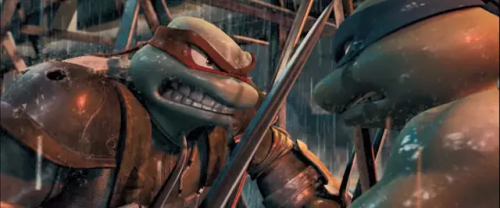
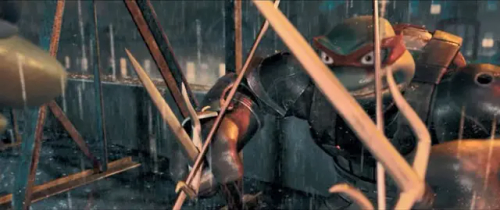

Just how much psi does it take to snap a katana? WELL, it turns out that finding out that information is really difficult (at least when I was nosing around and trying to find out). When I was doing my initial searching I found a video on facebook examining an anime scene (at the time-- back in September-- it was literally the only thing that remotely came close to answering my question that popped up) that claimed it would take at least 20,000 psi. Being that the person who posted that video didn't include any sources for reference, I'd take it with a grain of salt (especially since despite my best efforts I'm having a hard time finding that video again), but still. If-- for the sake of argument-- we assume that the 20,000 psi measurement is accurate for what it would take to snap a katana, that would mean that our boy Raph is capable of exerting that much force with each hand. And not just a brief spike of getting there either. No, for him to be capable of the force in that 2007 scene (again, assuming the number is accurate) then he has to maintain that force for longer than a second or two.
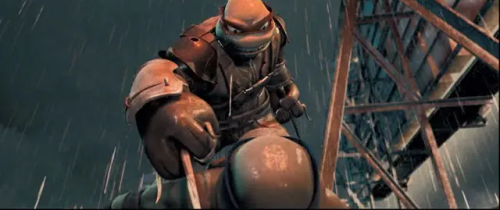
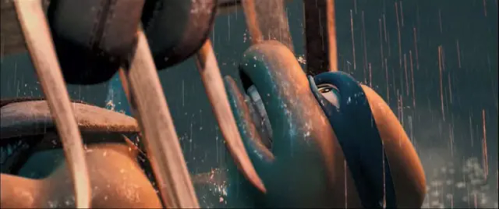
I don't know about you, but that makes this scene just that much more dangerous and intense in my eyes. It's not just that Raph could have killed Leo by stabbing him; it's also the implication that he could have easily torn Leo apart with his bare hands if he wanted to. So yeeeeeaaaahhhh, if Raph is able to get his hands on any of his brothers and is able to hold on, they're probably toast.
Weaknesses: Whoo boy. In most iterations, point blank, his biggest weakness is his temper. If he gets set off too thoroughly or if someone knows how to play it against him, his temper can make him get sloppy and lead to his defeat-- regardless of how ridiculously strong he is. It also means that, unless it's a version of him who has worked his ass off to keep himself in check, there's a good possibility that he might wind up doing things he'll regret when he's angry (and if someone really wants to twist the knife they can play that guilt and self-blame against him). If you go by 2003 and 2012 there's also his bug-phobia which can be played against him. (Even though 2003 Raph covers it with 'KILL IT WITH EXTREME PREJUDICE'.) If you go by Rise, then you DO NOT. EVER. WANT THAT BOY TO BE ALONE. And on a much more brutal note, going back to his stubbornness which is also one of his strengths
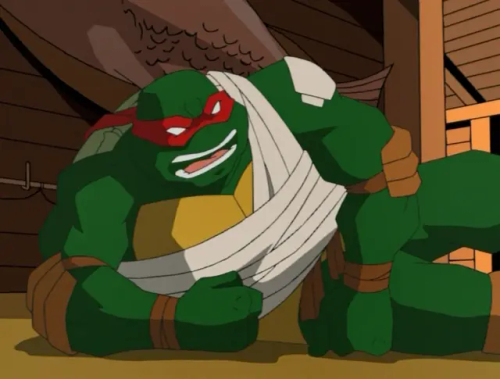
...there's a good chance that this boy might try to push himself past the breaking point if he feels it's necessary.
Speed: I've said before that I think Raph is pretty neck-in-neck with Leo when it comes to how fast he is, Mikey has them both beat in the speed department hands down, and Donnie is most likely to be the slowest moving of the four of them. If Leo has to deal with heavy weights while trying to move at speed however, Raph will have him outclassed due to having more practice in that department. For Raph to have a hope of keeping up with Mikey going full tilt in running away, Mikey would have to be carrying enough to weigh him down considerably. And while Donnie might stand a chance in trying to grapple with Raph, Raph having more experience in moving heavy weights at speed would probably mean Donnie would be better off trying to glom onto Raph like an octopus rather than outright grappling. So Raph's not the fastest, but he's not a slouch either.
Adaptability: As much as I love my boy, Raph is a tank, he's bruiser, he's a bulldozer who freely makes use of sharp and pointy things he can use to stab people with. Adaptability-- barring variation between sneaking in and out versus barreling in as loudly as possible to cause mayhem and destruction as a distraction-- is generally not in his wheelhouse. Given time and learning how to play mind games (and I don't doubt that an adult Raph could pick up and use the skill when he needs to) he'd probably become more flexible, but with where he's portrayed to be at in most iterations he hasn't gotten there yet.
Combat style/approach: Close-range, grappler, brawler, TANK. He WILL hold the line, he WILL dig in and hold his ground, he WILL be the wall and PROTECT with everything he has if he has to. He's also not above being outright brutally destructive when he feels it's warranted. And that "when he feels it's warranted" is key.
Details that affect the outcome:
Raph has a protective streak 500 miles wide. A lot of iterations try to be the wall for his family, the last line of defense when needed. He would sooner see himself hurt than anyone he cares about.
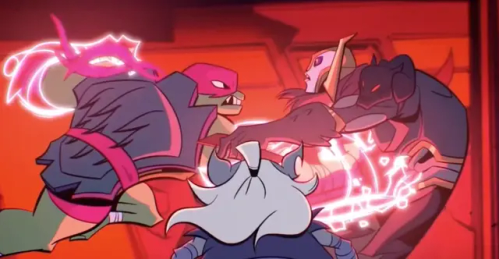
And it's not just his brothers, father, April, Casey, anyone-he-considers-family that he's protective of either.
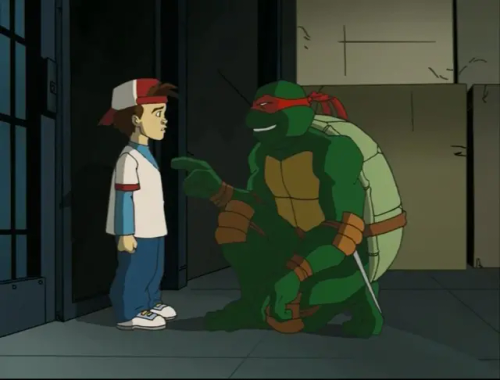
Seriously, if someone pushes the protective button on this boy and his sense of right and wrong kicks in, he WILL get involved.
Raph cares and feels deeply; to him, family is everything.
You
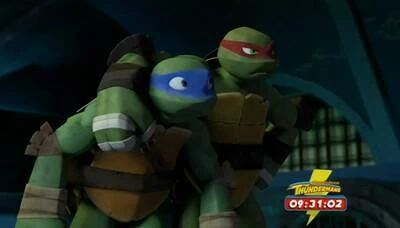
have

NO IDEA
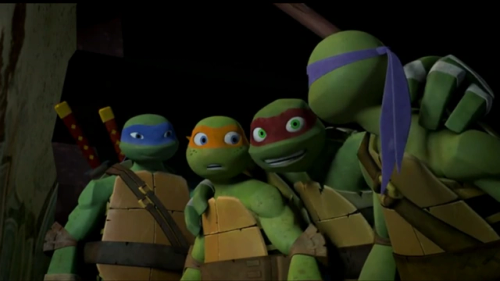
how much
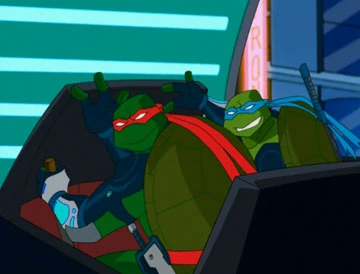
this boy
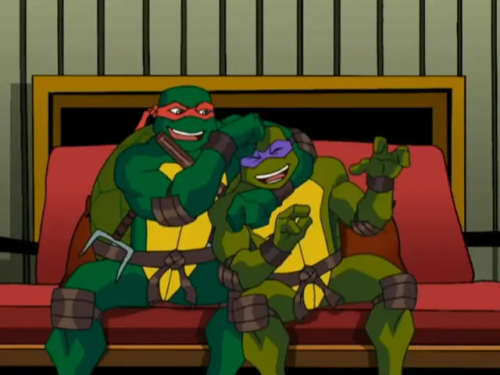
LOVES
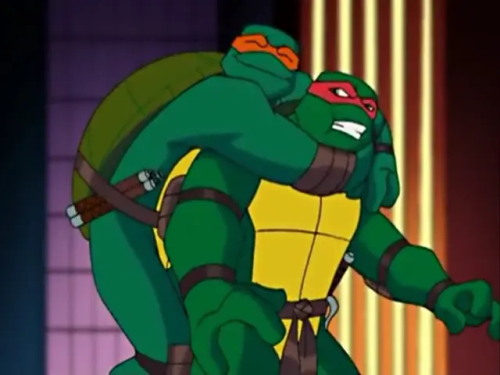
HIS FAMILY
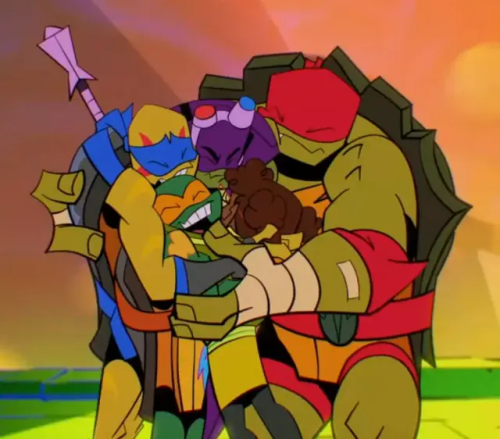
or how much he'd tear himself up if he ever seriously hurt any of them. So the chances of him ever actually going all-out against any of his brothers is slim. (And the few instances in various iterations where he's come close it's seriously screwed him up emotionally every time. Like 2003 and the pipe incident, 2007 and the after effects of his fight with Leo, the implied guilt Rise had after he snapped back to his senses after reuniting with his brothers after he'd been alone, etc.) He might fight with his brothers, he might disagree with them from time to time, but overall he comes off as someone who firmly believes you don't ever deliberately hurt someone you should care about if you can help it. Which is backed up by instances of him panicking in various iterations where his decisions might result in his family's deaths, as well as the fact that he only really turns on any of them (think SAINW) if they cross the line of not being there for each other like he feels they should be. Some iterations might threaten to run off a lot, but he never will without a damned good reason because he loves his family too much to ever want to do that to them.
Final Assessments
Raph vs Leo: If it's in close and is just down to strength-- Raph wins. If Leo has the time he needs to scheme and play Raph the way he needs to-- Leo wins.
Raph vs Donnie: If it's in close-- Raph wins unless Donnie pulls off an imitation of an octopus and gets all of Raph's limbs pinned and holds on for dear life. If Donnie has the distance, time to scheme, and the means to set traps to his heart's content-- plus tranqs, no one wins against tranqs-- Donnie wins.
Raph vs Mikey: If Raph can get his hands on Mikey and keep him in one place-- Raph wins. If Mikey plays Raph like a fiddle with his mind games and stays out of reach-- Mikey wins.
Raph vs the three of them together: Well shit, that'd be a losing proposition under the best circumstances unless the goal was to try to out-stubborn them at something. 10/10 if he had to, Raph would keep dragging himself along even if all three of his brothers were hanging on to him to try to keep him from reaching his goal. (And if Raph hasn't exploited that fact during some wild-as-shit game of theirs, then Casey Jones is the queen of England.)
Raph vs his guilt if he actually seriously hurt them: Instantaneous loss that Raph would probably have a hard time ever forgiving himself for.
So do I think Raph is as good a fighter as his brothers? Yes.
Do I think he's holding back so he doesn't hurt them? Also yes.
Do I think anyone he went up against if he didn't hold back would be thoroughly screwed? Emphatically YES.
-----------------------------
*The site I got the turtle size table in Donnie's section is [here], if anyone wants further details on sea turtles.

*rolls hand with an authoritative air*
I was requested by @magicmike5000 to share my opinion about what I think of Mikey, and I simply can not refuse such an opportunity to rave about one of the most intricate and fascinating characters of TMNT franchise.
*pushes up glasses with a clearing of my throat* Behold the ramblings of an insane person:
*I love how Mikey is unapologetically himself at all times, in all things and in all places
*I think he’s an incredible asset to the team who is unfortunately underestimated and appreciated.
*I be always affectionately considered him to be the the cheese that holds this whole turtle pizza together and it just wouldn’t be the TMNT without him.
*Mikey has fascinating undeveloped and growing potential that is so unfairly unexplored.
*His simple pure goodness is far reaching and a total game changer which I absolutely adore.
*He’s one of those rare few good people and I genuine believe that he’s the type of person where the world is a better place simply because he’s in it
*Mikey is refreshingly emotionally intelligent, empathetic, spiritually intuitive, and is CANONLY the most suited for ninjitsu out of all of his brothers.
*He’s a subtle master at ninjitsu due to his flexibility and adaptability.
*Mikey is fascinating to study in action because due to his ADHD it allows him to react quickly and work with what he has within the environment.
*It doesn’t matter his size or strength (even though he is woefully under appreciated for his strength) m because he knows how to use energy and motion against his opponents on MANY different facets.
*Mikey also doesn’t even necessarily needs to be the smartest either because he knows how to read the situation and interact with people and situations of all types.
*Bottom line, I love Mikey and I personally affronted that he is so unexplored as a character. It’s a down right CRIME I tell y’all that he and I can’t be besties because I feel like we would vibe like none other🧡
WHAT ABOUT MIKEY
*tilts head with a confused smile*
Howdy there friend? What about Mikey hon?
I’m sorry but I am the confusion 👉🏼😅👈🏼





@saspas-corner Here’s for 6 months of random friendship because of one fateful day in the comment section and thanks @ilivelikeimtrying for making this happen with your incredible analysis 😉🙌🏼🧡
HOLY HONK MY MIND IS LITERALLY 🤯🤯🤯
Nothing is more fabulous than deep character analysis 😤🙌🏼💙🤌🏼
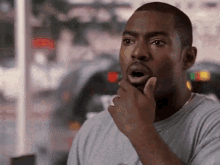
How Leo’s role as face man prevents him from confiding with his team
Watching throughout the entire series we see Leo constantly keep up with his role as the face man of the group
While on missions he can use his charisma and persuasion in order to get people to go along with his plans without letting people know what he’s really thinking
But he never seems to put it down
•Leos Emotional Guard
At first glance Leo’s entire personality revolves around being lenient laid back and chill, and to everyone else it makes him seem like a very open book, and that’s why the face man role works out for him
But it means that no one is really aware of anything beneath the surface. They never bother to ask because who would need to?
However, this also includes Leo’s family
Despite his chilled back personality Leo is one of the most emotionally guarded ones out of all of the brothers
Throughout the series we can see little moments of vulnerability from each members of the family, digging deeper into their emotions and their insecurities and then go on to discuss said feelings and gain some form of comfort or closure from their family. Most notable ones shown below


Donnie in “Donnie vs Witch Town”


Raph in “Anatawa Hitorijinai”


Mikey in “Hidden City’s Most Wanted”


April in “Always Be Brownies”
Splinter & Donnie in “Turtledega Nights”
•How Leo is Different
Similar to everyone else, Leo is shown to have these moments sprinkled in too but they never occur with his family
The two most memorable moments we have are shown in “Portaled Jacked” with Senor Hueso and during his one-on-one conversation with Casey
Why these two characters and not one of his close family members?
Because it’s easier talking about problems to strangers and people who don’t know you as they have no previous knowledge or connotations of you to fall back on and there’s no feelings of burden or guilt if you believe the topic will never be discussed with them again. There’s less feelings of consequences that comes with being vulnerable towards people who don’t know you well. Because if you open up more to the people who do, the risk that their opinion of you will change gets higher
Then we add in the fact that Leo is already extremely guarded of his emotions. He doesn’t want his brothers to think less of him because he already isn’t confident of his place in the team already and thus doesn’t confide in them


•Deflecting with Humor
And then the two moments where we do see little slips in Leo’s carefully constructed masks that occur around his family, which we can find in “Minotaur Maze” and “Many Unhappy Returns”
He ends up immediately backtracking and deflecting with humor, thus changing the subject and preventing anyone from delving into it further and reacting to the quips instead


“You know it’d really help me if you guys said that I was your champion.” “Just open it!”
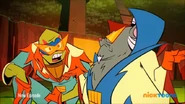

“This whole situation was my plan all along. If it wasn’t, then why’d I ask your tailor to make me this outfit?” “So we could both perish looking super fly?”
What makes it worse is that Leo has such a habit of doing it that his family expects it, which then causes them to believe there’s no underlying issues beneath the surface and thus don’t react accordingly. (with the addition that both parties had valid reasons for being upset with him at the time)
But it causes a situation of Leo internalizing his emotions, and if he doesn’t expand on the topic himself, then his family won’t see a reason to either nor think there’s an issue to begin with
•The Movie
To add onto this point, we see Raph and Leo arguing over Leo’s role as leader. As usual Leo deflects the argument with humor and avoids the situation. But we can see during the argument that how Leo privately lets down his guard and for a second the audience is able to see how he’s really reacting to Raph’s words. However, it is apparent that Raph doesn’t see this side of him and most likely never really has


“You just don’t get it Leo”
Now as the audience it is very easy to draw to the conclusion that Leo has clear issues with his role as the leader and most likely many insecurities regarding it thus why he acts the way he does. Like any other serious situation, he copes with, he deflects with humor and tries to avoid it
This argument then implies that in the two years since Leo was made leader of the group, he never revealed his internal issues with it and never made it apparent to his brothers either because he hates being vulnerable
The face man role works for him because it requires skillful work in that you can manipulate people the way you want to without ever letting them know what your thinking. And Leo carries that role with him when it comes to his brothers and family as well. But this doesn’t work out for him anymore when he becomes the leader and communication becomes so important to the team. (I talk about this more on a different post)
Thus the events of the movie and why things played out the way they did
Naturally he learns how to trust in his team more when the situation becomes dire enough that he realizes he can no longer keep deflecting
But even after all the traumatic events that he went through. When it comes to the one time we see him really cry. He still only lets himself cry when he’s completely alone within the prison dimension

TLDR: Leo’s role as the face man is kept on both on and off duty as we find that he is really one of the most emotionally guarded out of all of his brothers as he doesn’t want to let them know what he’s really feeling out of fear that they might think less of him as he is already insecure of his placement in the group and would rather confide in people who don’t know him well over his family where he runs the risk of them treating him differently
Honestly, “Mr. Emotionally Unavailable” has some real competition ahead of him
If we were being completely blunt, all of the brothers have trouble when it comes to letting go of their real emotions, Donnie just being out of his depth with them and it being uncomfortable, Raph wanting to be strong for his brothers, and Mikey most likely wanting to focus on his brother’s emotions over his own as the Therapist of the group, but i believe the Leo definitely has the worst case out of all of them.
random yap time.
i feel like when Khan was younger (probably around Uzi’s age, maybe a little older. idk, open to interpretation lol), during the time where he was still working for the humans and would definitely get physically abused by them, he learned to handle pain pretty well— and at the same time developed a high pain tolerance; basically to the point where pain just became a minor problem; for example, it wasn’t a main priority for him to cure an injury as soon as possible.
Why I bring this up is cause I find it kinda ironic that Khan probably handles an injury, no mater what severity it is, as an annoying inconvenience, while he is horrible at handling his emotional pain.
Like. C’mon. You’ve seen the guy.
Literally locks his problems behind a door, drowns in his grief of the loss of Nori by putting all of her kooky insane stuff in a closet (and that could be implying that he sometimes goes to that closet just to loathe) and using doors as an unhealthy coping mechanism in fear of failing everyone, so he could follow Nori’s wishes with her idea, and protect the colony of course. But in the end, it ended up hurting everyone who depended on him, drew him far away from his daughter, and not even realizing that he was hurting Uzi, he (in denial, mind you) thought he was doing the right thing.
But then he acts completely chill as he literally floats in the air in episode 7, very clearly signifying that he does not really fear physical danger (unless it’s a Murder Drone bc that’s a trigger for him. last time that happened, he got a PTSD panic attack infront of Uzi in the Pilot lmao /lh) plus also impling that this isn’t his first rodeo. Crazy shit like that has just become normal to him.
Which I don’t think I can pick if that is kinda funny, or just tragically saddening.
TRIGGER/CRINGE WARNING: cringey angst and a lot of annoying yapping about character analysis and character writing.
If you’re naturally very impatient I suggest scrolling off because there is a lot of text to read. I’m a huge nerd and I really enjoy character analysis. I’m not sorry
>:3
I’m bored so I’m just gonna do an extremely small doodle dump of SaD Springtrap stuff.


Now for the explanation and analysis.
DISCLAIMER!!! This is all my PERSONAL OPINION!!! I’m not trying to change people’s minds about stuff. I’m just sharing my thoughts.
Sooo… basically I like to put a lot of unnecessary angst on this dude lmfao. In my continuation/au, I wrote Springtrap to be depressed, anxious and sensitive because I wanted to make him act like he feels guilty about his past.
In the actual comic he sometimes feels guilty about his past and then he switches to not feeling bad about it and is instead proud of it. I noticed a pattern of him going back and forth. tbh when I first saw the comic I was very confused on where the direction his character was going. Like- “are you redeeming him or are you going to continue portraying him as a villain??” His situation kinda reminded me of an anti hero. It still confused me a lot at first though lol.
So basically the short answer is that;
I rewrote Springtrap in my au to actually show remorse because I thought it didn’t make any sense for him to switch back and forth from evil to good. Unless he was intended to be an anti hero or something idk.
I also wrote Springtrap this way partly because I personally thought that he can’t be extremely remorseful at the same time as proud of being evil. It just didn’t make sense to me. I could honestly go on for hours about how his character writing kinda sucks. So here’s how I see the rules for character arcs;
For example, if you want to make a character have a redemption arc, first, they are completely on the evil side. Then, throughout the development and the story, they slowly move closer to the good side by constantly contemplating their evil choices and gradually start to feel guilty and regretful about it. Here is where the mistake occurs;
You can’t make the character turn good, but at the same time, making them feel proud of being a villain.
For a villain arc this is vise versa.
If you reached the end of this post and actually read it, I genuinely thank you for listening to my thoughts and opinions. I would love to hear yours!
This took so long to write help-
Edit: I just realized I spelled “Awkward” wrong lmaooo.
I LOVE CHARACTER ANALYSES
I don’t talk about character analysis often, but considering I’m writing an anthropology and I haven’t seen anyone talk about this; I don’t see why not. This is all my opinion as well, you’re more than welcome to disagree.
I know people often see Archer to be submissive and subservient but I personally don’t see it that way (although, subservient sure but not entirely.) I don’t doubt that Archer is loyal and devoted to Giovanni, nor do I doubt that Archer was upset at his abandonment. However, there is one panel that sticks out significantly.

Specifically this panel, when Archer is telling who their plan benefits— there are 2 significant factors. He puts both team Rocket and himself before Giovanni.
You’d think if he was submissively loyal he would put Giovanni first in his mind, but that’s not the case. Archer has his own agenda in mind with the attribute that it benefits Giovanni as well; when in reality it does not. I don’t doubt that what he does is for Giovanni’s honor, but I frankly think it’s only for Giovanni’s honor and the notoriety of Team Rocket; not for Giovanni entirely as a whole.
I can explain my opinion more indepth, but I’d rather let it wait for when I finish my anthropology because it would include other manga panels. In the meantime, feel free to do what you will with the panel. And if you disagree, you are more than welcomed too; there is no definite answer after all.
So I was thinking about Starlo and Chujin
Hi. I love overanalysis. It’s in my blog title as “lore enthusiast.” Most of this probably means nothing and was unintentional, but I’m like an English teacher when it comes to media I like and am scrounging for canon content— I will see something that might have capital I Implications if you think about it hard enough, and I will shake you by the shoulders and go “WHAT DOES IT MEAAAN”
Which brings me to Starlo and Chujin and a thing I noticed while looking through the Spriter’s Resource for Starlo references. Long rant and UTY spoilers below the cut.
I should start off by saying that Starlo and Chujin are similar, in a way. Both of them are nerds, although for different things. Both are said to be caring. Both dedicated their lives to their work. Both wanted to help monsterkind. Both loved Ceroba. Both had secrets.
These similarities have not gone unnoticed, I’ve found— both by the fandom and the devs of UTY.
(Transcript:
Sword: “It does make sense that, like, Chujin and Starlo are kinda similar, and Ceroba, yknow…. She has a type, I guess.”)
So it’s not a secret these two are similar, and it’s probably intentional to make them parallel each other.
But from there, we get to the meat of this post:


These sprites.
This is where I dive into a lot of overanalysis— I’m giving that as a warning before I start. My point here though, is that these two sprites feel incredibly similar in a way where I speculate if it was intentional or not.
I’ll play devil’s advocate first, though. I’m an artist. I draw things, mostly characters and creatures. Sometimes you just have two pieces looking similar— not because you intended it that way, but because the blocking and composition was best that way.
For Starlo’s sprite, the answer feels simple. All of Starlo’s talk portraits are front facing, so this one doesn’t have a need to be any different. If it was, it may feel out of place amongst all the other sprites, especially because there isn’t a reason for him to have this sprite in particular face a different direction. He isn’t looking around, and isn’t averting his gaze. He’s being direct. The best way to convey that is with eye contact (or at least, implied eye contact) via a front facing sprite. Additionally, even if Starlo was averting his gaze, with how UT’s talk sprites work, there are better ways to convey that than changing the way his talk sprite faces.
Starlo’s character as himself also contributes to the way this sprite looks. It’s a direct contrast to the loud, boisterous North Star. This is the monster behind the persona— one who’s a lot less confident, one who thinks himself a ghost to the people around him. A “nobody farmer,” in his words. When trying to get this across, art-wise, the way Starlo’s talk sprites look as opposed to North Star’s talk sprites are a perfect fit! It’s in the subtle expressions versus animated expressions. This is even down to how Starlo’s glasses are drawn, not showing his eyes behind them, giving him a much more distant look.
As for Chujin’s sprite, the answer also feels fairly simple. The sprite pictured earlier was for his tapes, where it would make sense for most of his sprites to be front facing. He’s talking to the camera, it’s a video log. Being silhouetted also works here— it makes him more mysterious in a way.
That’s what I have to say if you look at it JUST from an art point. However, we like to be a little silly in this house (my blog), so I’m going to overanalyze the hell out of this.
So. The pose.
I’m probably going insane at this point. I’ve already explained the most likely reason for the poses being similar, and don’t get me wrong, that’s probably the main reason why. But also— note the eyes.


According to the Spriter’s Resource, Chujin’s sprites usually have his eyes visible from behind his goggles.
But.


There are exceptions.
I think the reason for this lies in the same reason we never see Starlo’s eyes behind his glasses after he takes the hat off. I explained this earlier when discussing the artistic reasoning behind these sprites— not seeing Starlo’s eyes makes him appear more distant, which highlights the part of his character that’s much less confident in himself. We go from seeing his eyes (or at least, the shape of them behind his glasses, this is a consistency with UTY sprites I can talk about later) to not at all.
This is what makes Chujin’s sprites so important to me.
We’re meant to like Chujin. At least, before we know the truth. We’re meant to think he was always a kindhearted man, a loving father and husband, and a good mentor. All the good things. It’s only as the game continues that you see the imperfections. By talking to Dina, you see he didn’t like the Wild East due to what it stood for, and you learn of the time he came into the saloon all disheveled, uncharacteristically asking for a drink, only mentioning he thought he “saw a ghost”. You learn in the Steamworks of his research, and how he wasn’t as good at robotics as he was made out to be.
That’s what makes Chujin flawed, though. It’s not necessarily a bad thing, none of these things will make a player dislike him. As said— we’re supposed to like Chujin. An opinion and a mysterious saloon visit isn’t the end of the world. We also grow to learn more and more about him, and he seems just like a kind man with a love for robotics (even if he struggled).
And then we learn of Ceroba’s plan. And we learn of something hidden in the abandoned Ketsukane Estate.
This is the first time in the Pacifist route that we actually SEE Chujin, first in a photo.

Note the eyes.
We see Chujin’s eyes behind his goggles here! Once again— this is likely for the reason mentioned before. We’ve only been told mostly good things about Chujin so far! Here’s a photo of him and his family— how could this kind man be wrapped in anything suspicious?
Which then makes the sudden change in the tapes crucial.
We can no longer see his eyes— he’s grown distant, mysterious. This is the part of Chujin that he kept secret from even Ceroba, up until he was on his deathbed. It’s the part of him that isn’t necessarily the loving husband and father we know him as, but rather, this is the part of him that was a determined researcher on a mission. And therefore, Chujin goes from lively to cold.
I’m sure that last bit doesn’t ring any alarm bells at all.
Hey! Remember how I said Starlo and Chujin are similar in ways? This is where I get into that. I’m applauding you from behind my screen if you’re still reading.
I’m now going to talk about Starlo and Chujin as characters, as well as the parallels between the two sprites that started this analysis. For simplicity, I’ll break these into sections. Funky names for a funky reading experience, so I’m not just word dumping at you.
1) Got a secret, can you keep it?
Soooo. Chujin and Starlo’s secrets.
One of the first things that rings alarm bells for me is the situation in which both of the sprites I’m analyzing pop up in. Context is key. Specifically, both of the sprites are used when we’re learning the truth about each character.
For Starlo, we’re learning about who he really is, the monster behind the persona. He takes his hat off, reveals the monster underneath, and we get his new talk sprite. He’s finally stopping, for a second— taking a moment to break the act he’s been playing for YEARS. And he does it all to show Ceroba he’s still there underneath it all, as well as reveal to Clover who he really is. He’s at his most vulnerable state, revealing how he sees himself as a nobody, and a fraud.
For Chujin, we’re learning part of the truth of who he was, when he’s at his most morally dubious. We learn of his experiments, the ones he worked on and hid from his family until he was about to die— only then did he tell Ceroba. We also learn of his views and opinions, the reasoning behind them, and how he lied about his job at the Steamworks. He couldn’t bring himself to tell Ceroba he was fired, because he didn’t want her to think less of him.
So, the main points of this:
Starlo and Chujin both had their own secrets
Both of their secrets are revealed when these sprites are used
Both secrets reveal more about the characters’ identities
Both want to be seen in a good light
The main difference, I think, other than what the secrets entail themselves, are what they mean for each character.
2) Light and dark symbolism?? In MY overanalysis??? It’s more likely than you think
Chujin and Starlo’s secrets both weigh on them. Starlo doesn’t want to break character— he enjoys being North Star and wants to bring a smile to the faces of monsterkind. Chujin doesn’t want Ceroba to think any lesser of him for his mistakes.
Additionally, the reveal of their secrets marks two different things for their characters. For Starlo, it’s a step forward. For Chujin, it’s spiraling down.
This gets really fun considering these two sprites, and light and dark symbolism (not in the traditional good versus evil way).
Starlo’s in the light. He’s showing himself, he’s maturing. He’s being incredibly vulnerable for probably the first time in a LONG time, and finally breaking the persona. He’s working towards a better goal, accepting both North Star and Starlo as facets of himself, but it starts with taking off the hat. It starts with coming into the light, and letting the shadows fade away.
Chujin is silhouetted in darkness. As said previously, we only ever hear mostly good things about Chujin from those who were around him (barring Starlo, although that’s secondhand information, and by some extent, Dina). Martlet and Ceroba saw the best in him, a mentor and loving husband respectively. But as he rambles off to his tapes, shrouded in shadow and secrecy, we learn of what was happening behind the scenes: he reveals part of who he really was, and how much he hid away from those he loved, all away from the rose colored glasses.
3) “Your opinion is wrong” -Chujin, probably
To just point out more ways Chujin and Starlo parallel yet also contrast one another (which I will mention for the section after this as well): I think it goes without saying that Starlo and Chujin have opposite worldviews when it comes to humans.
Chujin believes the worst in humans, primarily due to the Snowdin Attack. He hates them— The War was when the blade was plunged into monsterkind’s flesh, and the Snowdin Attack was only a twist of the knife.
Starlo admires humans, maybe a bit too much for some monsters. He loves their stories, loves the idea of cowboys and Westerns, so much so he creates the Wild East with his posse.
This is what makes these two different, only strengthening the light/dark contrast. The ideas of hate and admiration fit well into that theme, don’t they?
Stick with me here. I promise this is going somewhere.
4) “Monsterkind’s Hero is a title soaked in blood.”
So, the aforementioned views of humans? This gets really fun when you apply it to the crux of Starlo and Chujin’s missions: to help monsterkind during their time underground.
Both want to be heroes, in a way. They both want to help. Of course, this is in different ways— but the main intention behind it is the same.
Chujin, as said, hates humans. He wants monsters to be brought to justice. After the Snowdin Attack, he decides that if he can’t help through Axis, then he’ll help another way. Thus starts Chujin’s dedication to his experiments, which he makes his work and eventually the rest of his life. All of it for a chance to help monsterkind when the time comes.
Starlo’s dedication to the Wild East is similar, in a way, yet directly contrasts Chujin. His admiration for humans and Westerns goes to the point he wants to provide monsterkind with their own “slice of the Surface.” He wants to see those around him smile— his own way of helping monsterkind when they’re still stuck underground.
My point here is that while they find different ways to accomplish their missions (and you can drag more light/dark symbolism out of this— Chujin hidden away in the shadows of the basement in the Ketsukane Estate versus Starlo out in the spotlight), both have so much dedication to it that it becomes their lives.
Chujin, although having a family he loved and cared for, let his experiments drive him onwards to the point it cost him his life. Starlo willingly gave up who he was to be North Star, letting the Wild East become his life.
5) Yes, and?
I could go on and on about more similarities and differences between Starlo and Chujin, but I feel like I’ve brought up what I need to for now.
Why bring all of this up in the first place, though? What’s the point of going on about these characters’ missions, or their secrets, or all the light and dark symbolism you could hypothetically draw from it?
Let me talk about those sprites again.
I’ve spent ages going on about Starlo and Chujin, and how they parallel, yet contrast each other. They’re foils, in a way. These similarities and differences are what make these two little sprites so interesting to me.
You could say it’s all because that’s what the scene needed at the time, and that statement likely has truth to it. I already talked about how. But the knowledge of the context of the scenes and these two characters is what makes me wonder if it all was done on purpose.
Chujin, shrouded in shadow, revealing a part of him kept secret from even those he loved most. His reasoning for his hatred for humans comes on full display, and he begins to formulate a mission, the same one his life would eventually fall to. If the royals won’t see how much he cares for monsterkind, he’ll show it himself.
Starlo, left in the Swealterstone’s light, revealing a part of him the Wild East knows nothing of. His mission starts to redefine itself, and it’s original intent becomes more clear. He only ever wanted to be someone. He only ever wanted to help. Maybe now, with the hat off, he can learn to make others happy, but not forget himself in the process.
A conclusion:
So. Do I think that these two sprites for Starlo and Chujin were intentionally made to parallel yet also contrast each other?
My answer is a big fat Maybe. I can’t be entirely sure.
Truth is, I’m not a UTY dev. I literally only discovered and got into this game a little over a month ago. I don’t know the true intent behind the spritework, I don’t know the conversations that happened behind the scenes. I am literally just A Guy ranting on the internet about a silly little fangame that I have brainrot over.
But! I do have a finalized game and commentary I can analyze, and knowing that some spritework details were intentional (the way that Chujin’s talk sprites face are made to match Ceroba and Kanako’s), I could see something like this being either intentional or a really fun coincidence. The type of thing the devs can look back on and realize “oh! That’s funny how I accidentally made that parallel. I didn’t mean to do that, but it works.”
I can only hope it was intentional. Chujin and Starlo are both incredibly interesting characters to me, especially in how they can be seen as foils. Something as minor as this I think just shows the love put into this game and these characters. UTY is just a great game overall, in my opinion.
But yeah! That’s my ramble, all because I was doing sprite studies and looking for references in the Spriter’s Resource for art. Hopefully I made at least some sense :)
Sabo: loneliness, connection and affection
Trying to organise my thoughts on this matter hehe
I just thought that Sabo's relationship with loneliness and connection are very interesting, and not much people talk about how terribly lonely his childhood days were(even compared to Ace&Luffy).
Ace has been alienated from people from the beginning. Raised in the middle of the jungle, by bandits who never showed much affection, and who repeated the same hurtful words as others did. The state of loneliness is the norm for him. He has never known any other life. Naturally, he'd be protective of what little he has(Sabo) and reluctant to open up and accept new connections(Luffy).
As for Luffy, he has been left alone. Shanks left him after a year staying at Windmill village. Garp constantly took him out of his regular life only to leave him alone in the jungle. And he as well took him away from the village and Makino, after he ate his devil fruit. And while he didn't have [present] parents, he had been cared for. Luffy knows the difference between loneliness and companionship. Which is why he chased Ace's recognition so much.
Sabo's situation is more similar to Luffy's.

But do you ever think that Sabo loved his parents? That he wanted them to love him too? He wouldn't have drawn them if he didn't. He wouldn't be so disheartened at their dismissal if he hated them from the start. But his parents made their love conditional. Sabo had to earn their love and his happiness, while they ignored his pain and attempts to connect.

And as you know this kind of relationship could leave a lasting impact on how one navigates their future relationships! But on that later😊
Now, Sabo ran away and that opened a whole other can of worms. He's a child, that for five years didn't have anyone to rely on. Of course, Ace was with him, but after he left for the day, Sabo was left completely alone. I mean, at least Ace had Dadan and occasionally Makino and Garp, they shared meals together, he could turn to them in case something happened and they provided him with company and a roof above his head. Sabo lived on the Gray Terminal by himself, in a place where people considered him either a troublemaker to avoid, or a pest to get rid of (those like pirates and bandits). So through Ace and Luffy Sabo gains not only brothers but also other connections and people who care about him! And he welcomes both Dadan and Makino with a bright smile :) Now that I think about it, just like Ace told him about Luffy, he also must've told Sabo about them too🥹
And while all this is nice, his previous problems didn't go away magically.
(… But his issues aren't stated or shown as explicitly as Ace and Luffy's, so they are easier to dismiss.)
Even though Sabo trusted Ace with his life, he still kept his origins a secret from him, whether it was because he felt them insignificant compared to Ace's or because he feared abandonment in case Ace would be disappointed. And he was more than willing to keep his secret until the very end - Luffy&Ace literally had to beat(strangle) the truth out of him. Sabo also put distance between them in another way too: Ace thought the two of them would sail together, Sabo didn't.
That is honestly also a point to how controlling his parents were. Sabo wanted freedom so much that he didn't mind the loneliness that came with it. Well, he got what he wanted ;)
Now it would be easy to say that his amnesia also erased his trauma. But it didn't! Sabo still felt hid parents' influence. (And unlike the other weird amnesia case (the sea sure likes to take people's memories huh) - Big Mom - he didn't revert to his younger self, he only lost access to his memories, his feelings and 'character development' remained). If anything it only led to Sabo not being able to identify the cause of his issues → not being able to treat them properly. Now, the RA seem like decent guys, they very well could be the needed support system for Sabo, but again, it's an army with a whole lot of other issues to deal with. So either way his trauma most likely was allowed to fester for a while as we see its consequences show in his adulthood.
Even though Sabo seems to be doing well as an adult, there's still some signs of emotional distance. He has never reciprocated a hug, even though he doesn't have a problem with physical touch in general, he didn't even think about approaching Luffy in Dressrosa at first and was very tense when actually talking to him. And it's honestly fascinating just how stiff his body language was in Dressrosa (maybe I'll talk about it in general some other time) - be it shock or anger he keeps his arms to his body, unlike Koala or Hack, who choose violence.



He also showed barely any reaction during Vegapunk's speech despite the panelling focusing on him specifically. I'd say he mostly keeps his negative emotions in check, bc in Robin's little flashback he was quite expressive! The main counterpoint is 'special Luff' where he is very open about his anger, but he has a really decent reason for it: his feelings being made fun of. And as you'll see later it's a very sensitive topic for him →
To begin with, he avoids talking about things that have emotionally impacted him in any way.



1.This one might be a stretch, but he begins to talk about his encounter with Fujitora, only not to say anything in the end, idk what's wrong with him; 2. After a very emotional fight with Burgess Sabo dismisses any worries without even mentioning the fight; 3. He refuses to talk with Hack about Luffy, even though we know that he loves to yap about him to Dragon. And that is right after he didn't want to wake Luffy up to even say goodbye! He also changes the topic quickly so Karasu wouldn't be able to further question him.
Even though these scenes are played as gags, he really seems to have trouble with emotional intimacy and opening up about his feelings. And that makes him seem inattentive and irresponsible, thus affecting his relationships with others even more…
And speaking of which, he is accustomed with either suppressing his feelings or at least just keeping them in check. He hides his worries from his colleagues, appearing as cheerful as always. And during his meeting with Dragon and Iva he brushes aside his guilt and grief for king Kobra (but, I mean it's a work meeting, they need to be professional) and never once he acknowledges his injuries.


And if he's willing to disregard such a thing as grief, how do you think he really feels about his new title, which was gained by the blood of a man he failed to save?
And frankly, right now we don't know much about Sabo! We know about his childhood, and the way he presents himself now(and that is some material to work with), but the 12 years in the Revolutionary Army are a mystery, and again it's an army, I bet he's seen many things, especially considering how high his position is!
tldr: like Luffy, Sabo has a special relationship with loneliness and abandonment. But unlike Luffy, who especially in pre-ts hated separation, Sabo pushes people away. And what makes it even harder for others to connect with him, is that he tends to hide his feelings and problems.
(like a cat)
but again, I might be reading something wrong, my bad
there’s always something about a dying character who’s desperate to keeping living, not for the sake of living, but for the sake of being remembered when they’re inevitably gone